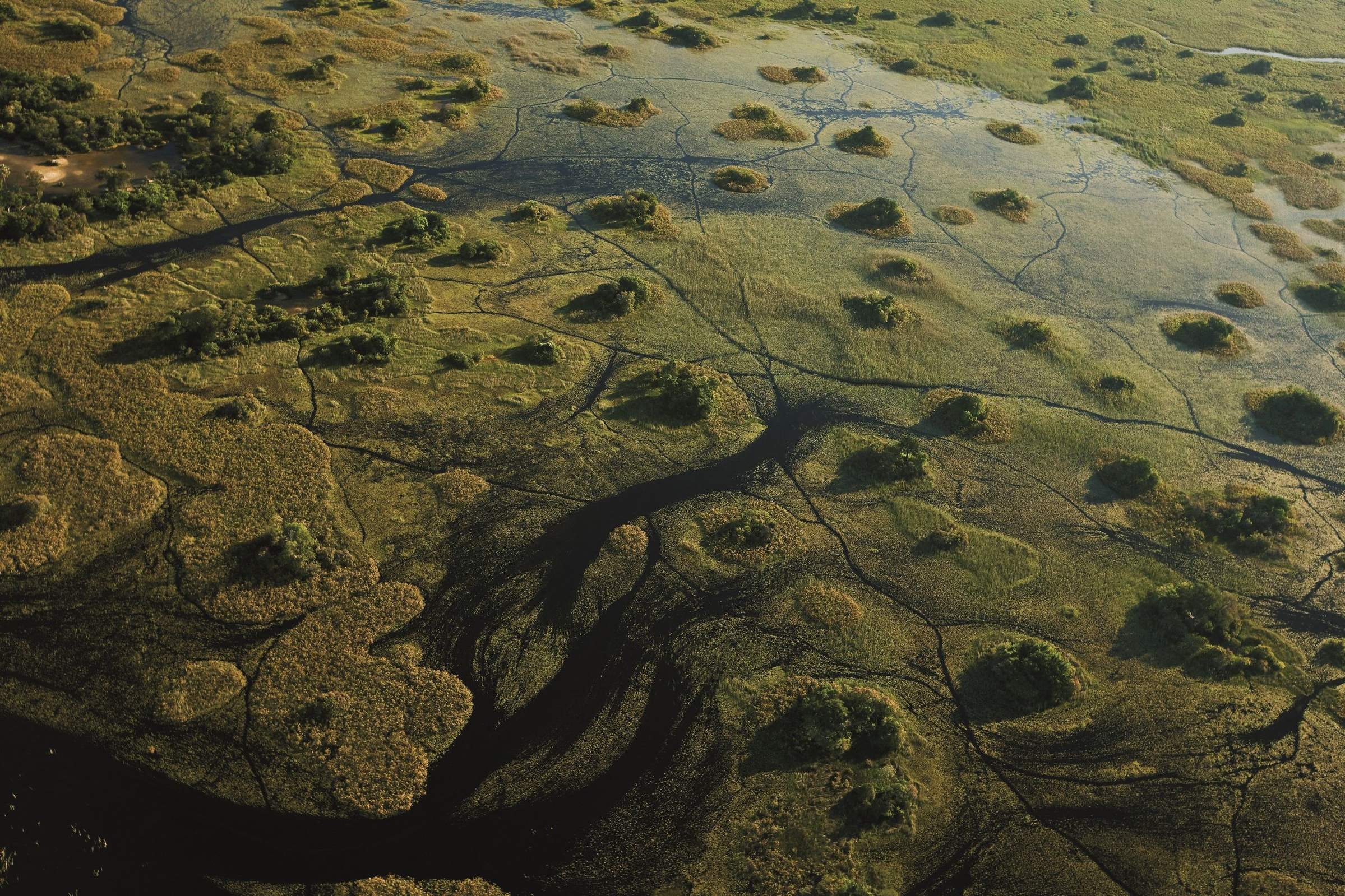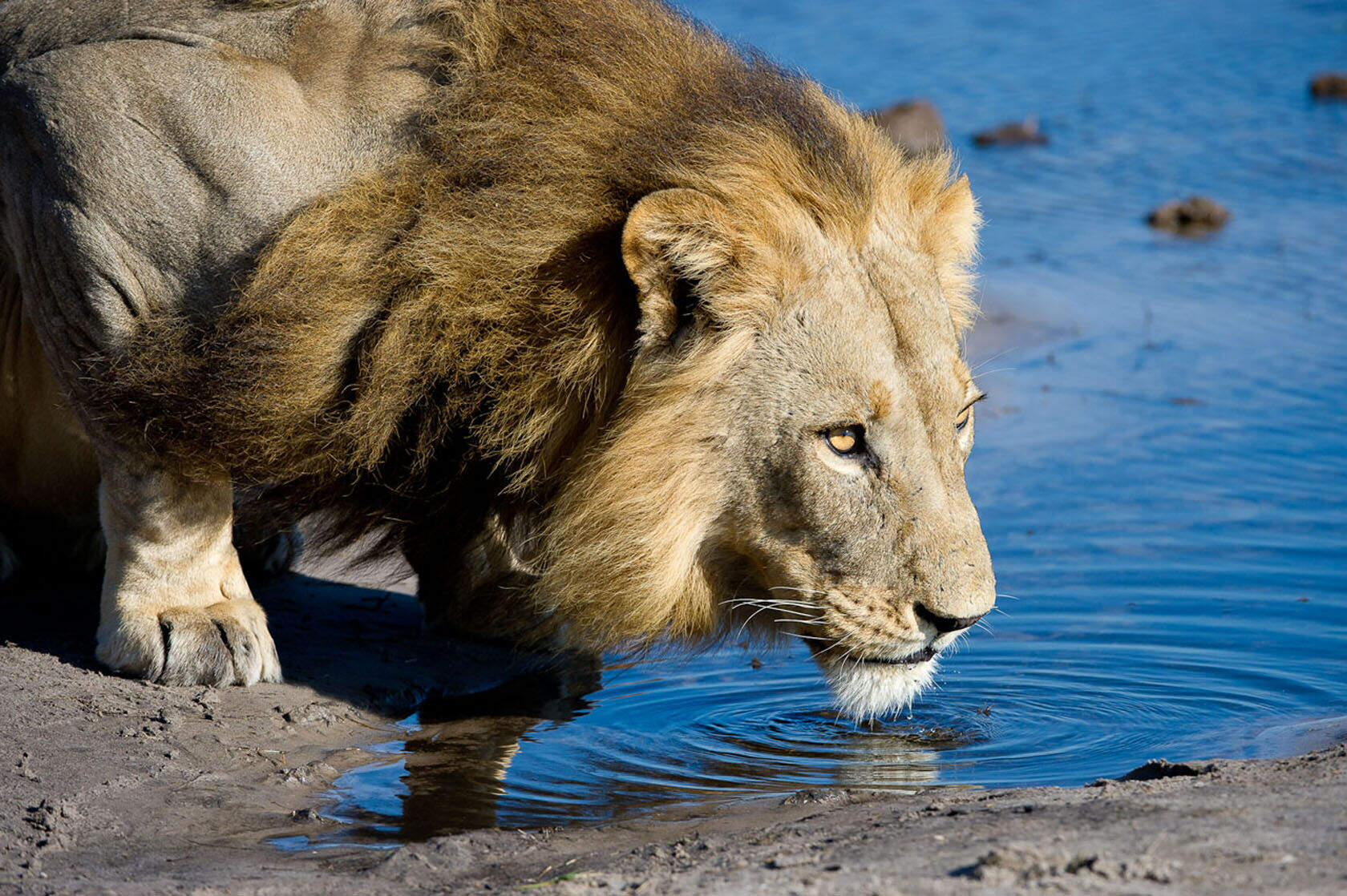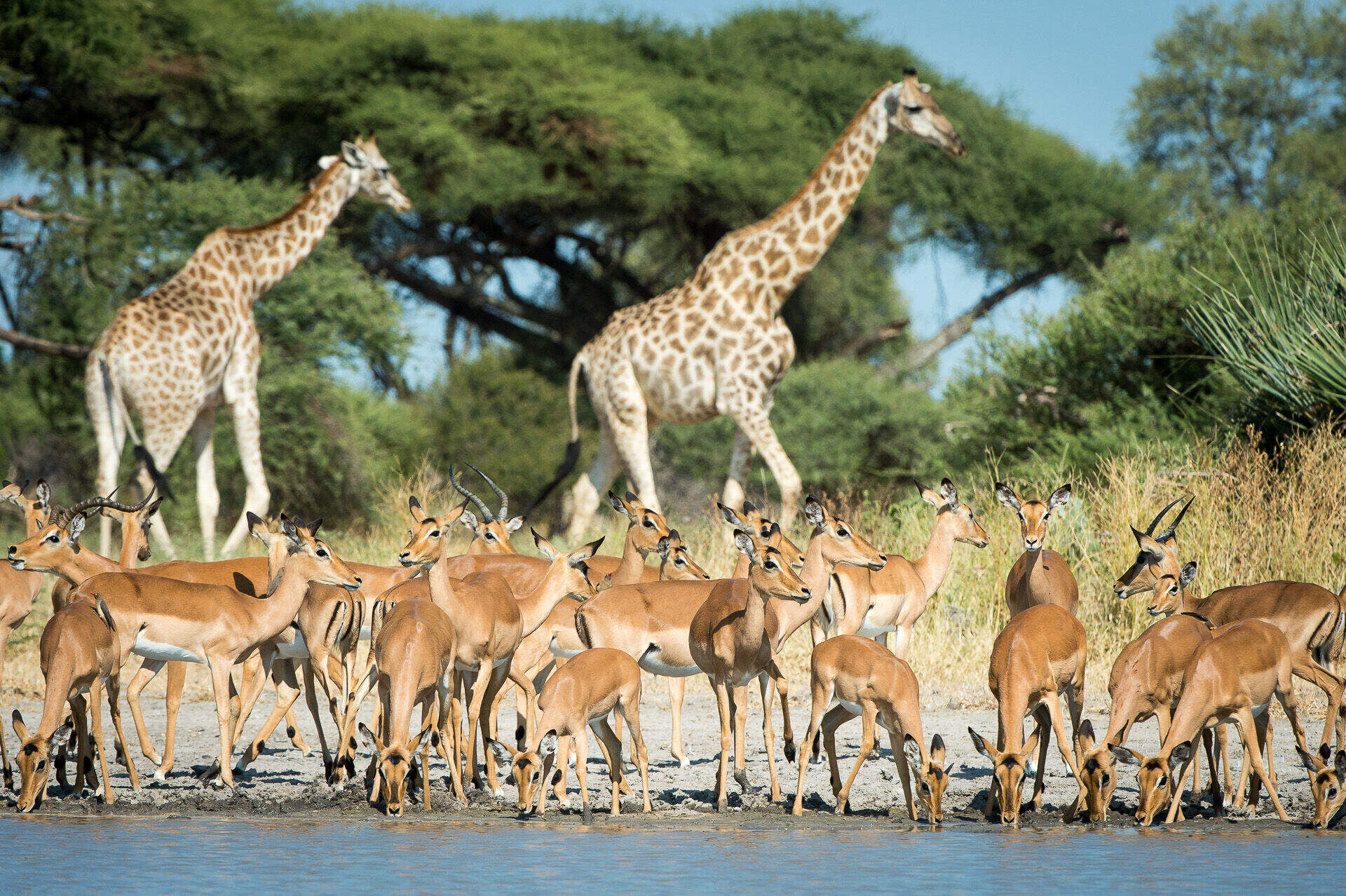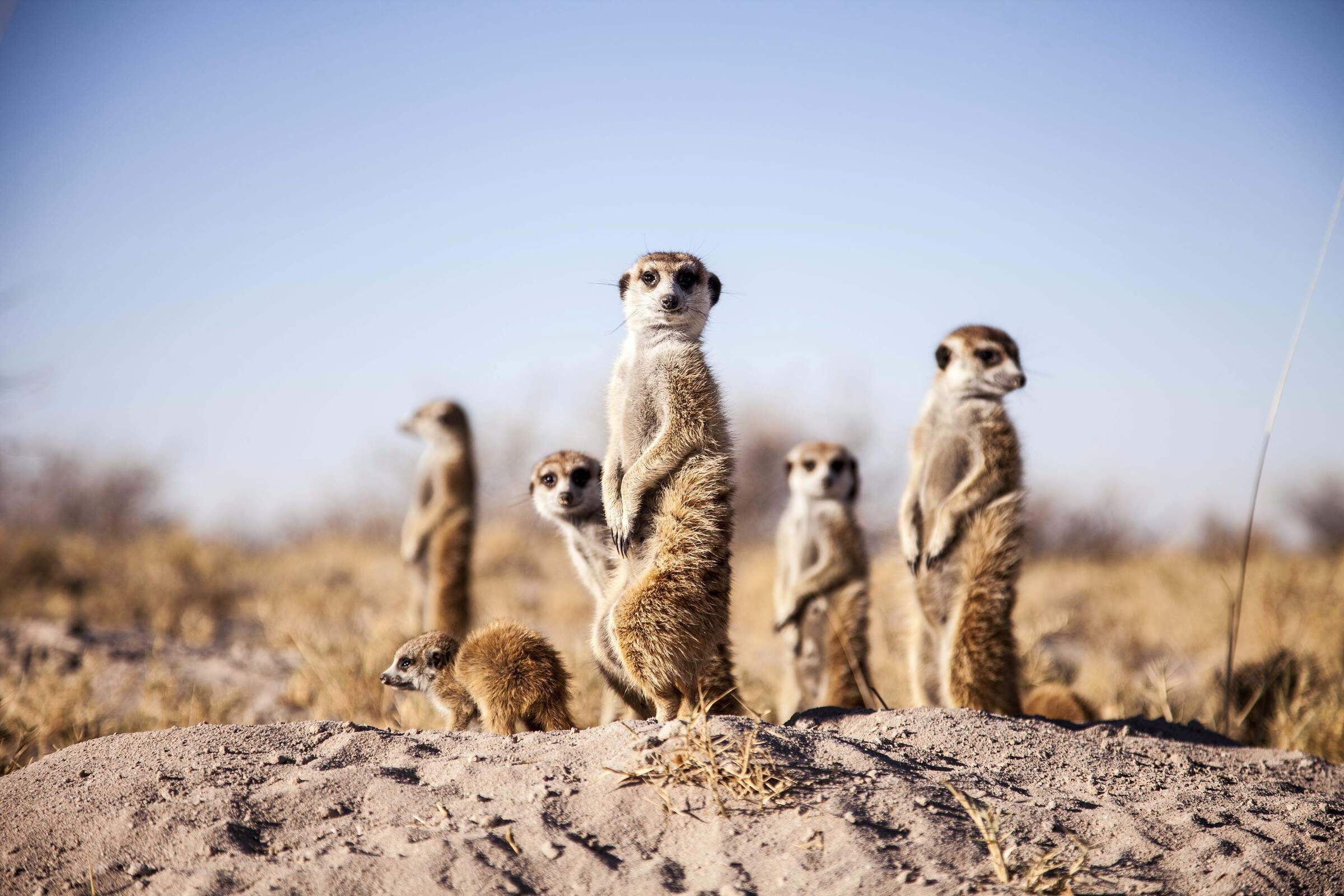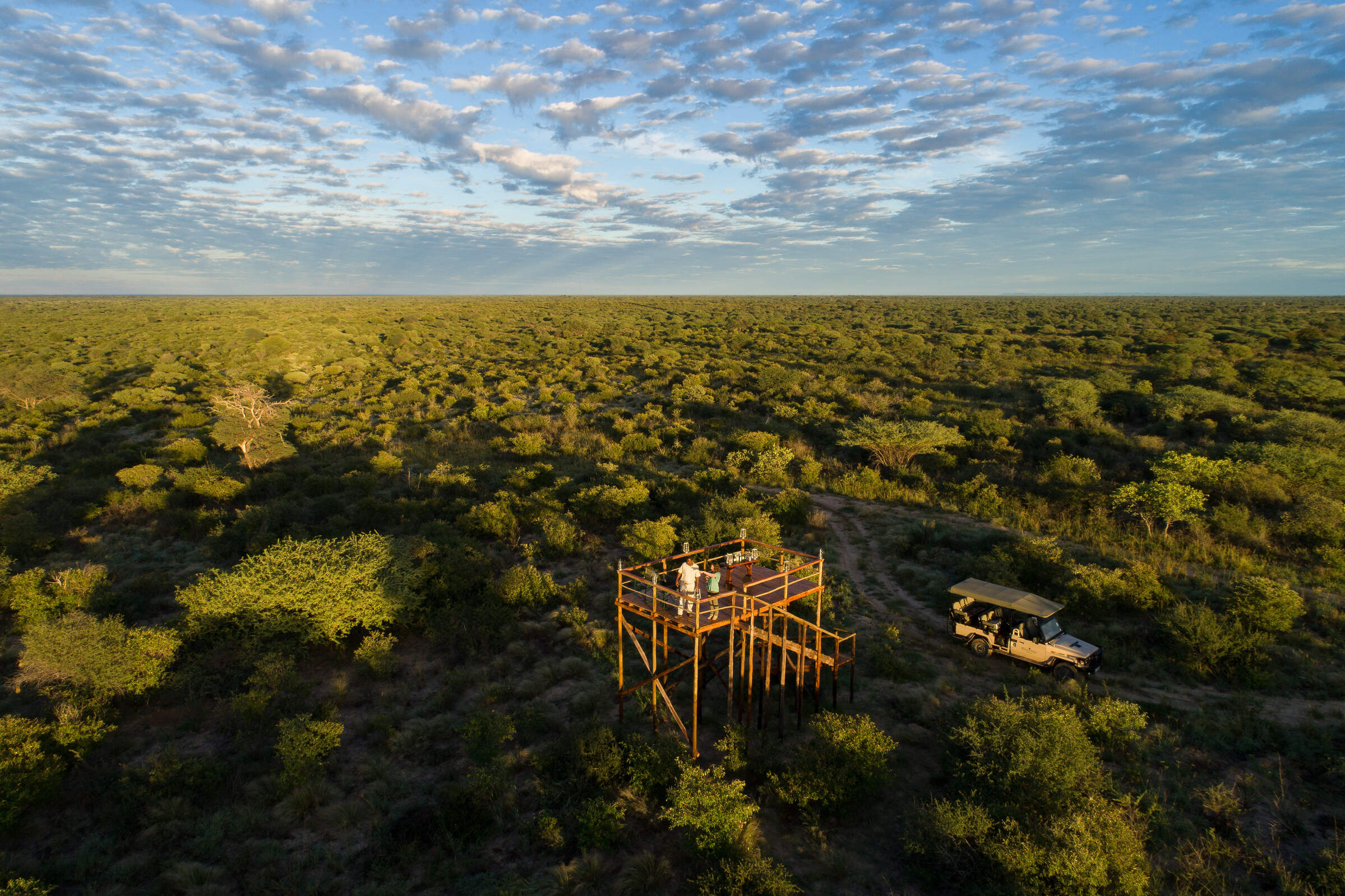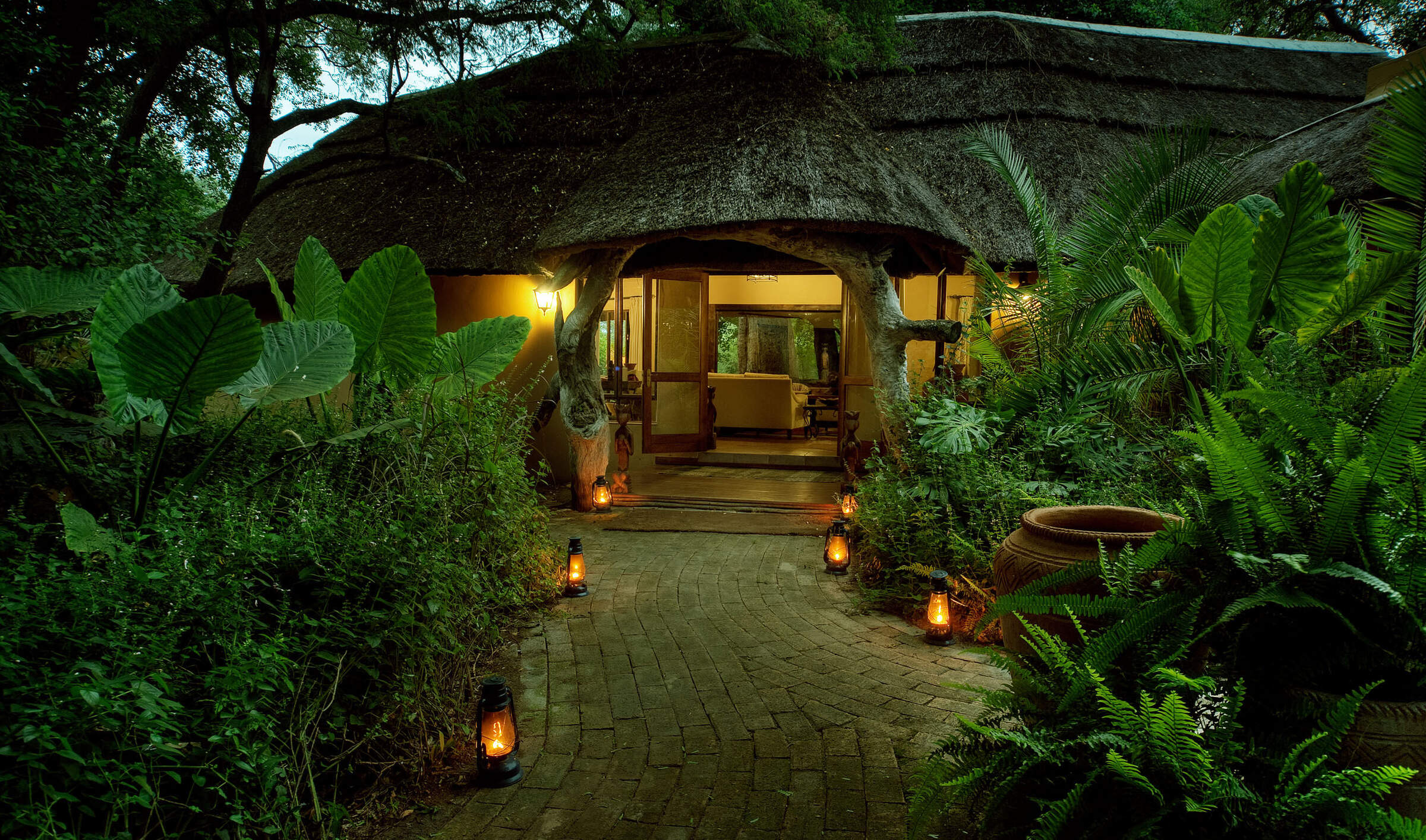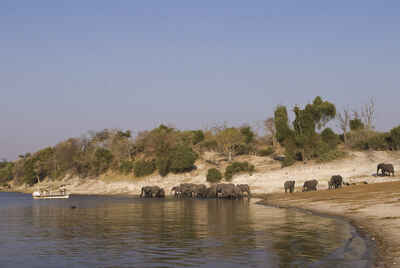
Chobe, famous for its magnificent elephant herds
Explore the park on a mobile safari
Explore Botswana's northern boundary - the Chobe River
The wildlife is equally relaxed with boats on the Chobe River
The peace and quiet of an African sunset
The rains mean lush grazing opportunities in the Chobe
Chobe National Park
Chobe National Park
Chobe is classic big-game country: legendary herds of buffalo and elephant, matched by exceptional prides of lion.
From lush river floodplains to expansive marshlands, it stands as an irresistible magnet for wildlife. Even at the height of the dry season, when the Kalahari landscape withers under the relentless sun, the permanent waters of the Chobe River are a lifeline, drawing animals great and small.
The river is a natural theatre, where herds of elephants cross its waters – an unforgettable sight, especially from a riverboat safari. As you glide along, you’ll encounter pods of yawning hippos and vibrant birdlife, from cranes and herons to colourful kingfishers and storks patrolling the banks. It’s a serene yet thrilling way to experience Chobe’s wildlife spectacle.
Beyond the river, dense bush hides Chobe’s powerful predators. Lion prides lie in wait for unsuspecting prey, while leopards lurk on the escarpment rocks, preparing for their nightly hunt. The eastern riverfront may attract many safari-goers, but the rewards are plentiful. However, venture westward, where lodges and 4WD vehicles thin out, and you’ll discover a deeper, more magical sense of seclusion. For those craving an adventure, a private mobile safari through Savuti Marsh offers access to this extraordinary area.
When the unpredictable Savuti Channel flows, it transforms the plains into a lush marshland, but in its drier phases, the early rains bring a burst of life, turning the harsh landscape into a vibrant ecosystem where predators and prey navigate the delicate balance of survival. Here, nature’s cycles are on full display, each season offering a new chapter in this timeless saga.
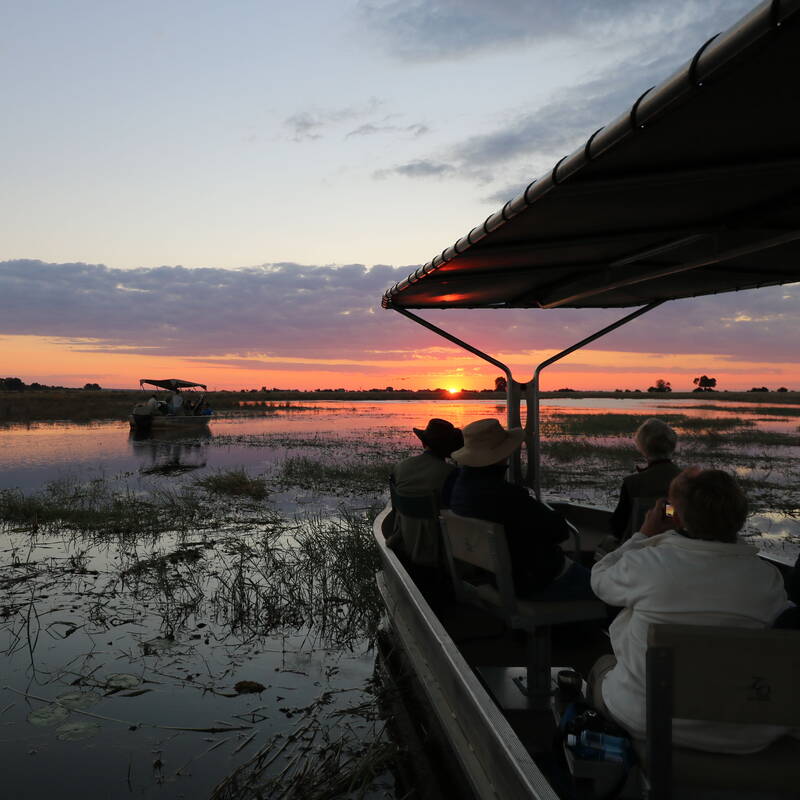
The best safaris in Chobe National Park
Chobe National Park offers diverse and iconic safari experiences, from the elephant-packed riverbanks of the Chobe Riverfront, to the predator-rich Savuti Marsh, and the secluded Linyanti Private Reserve. Each area has its own distinct wildlife and atmosphere.
Botswana’s dedication to low-impact tourism ensures that exclusive and immersive experiences are possible away from the busier areas of Chobe. So whether you’re drawn to the rivers which act as such a magnet for the wildlife or prefer a private mobile safari in the untamed wilderness of Savuti, we can tailor a safari to fit your interests.
Talk to our safari experts about your ideal Chobe itinerary, perhaps in combination with the Okavango Delta or Victoria Falls.
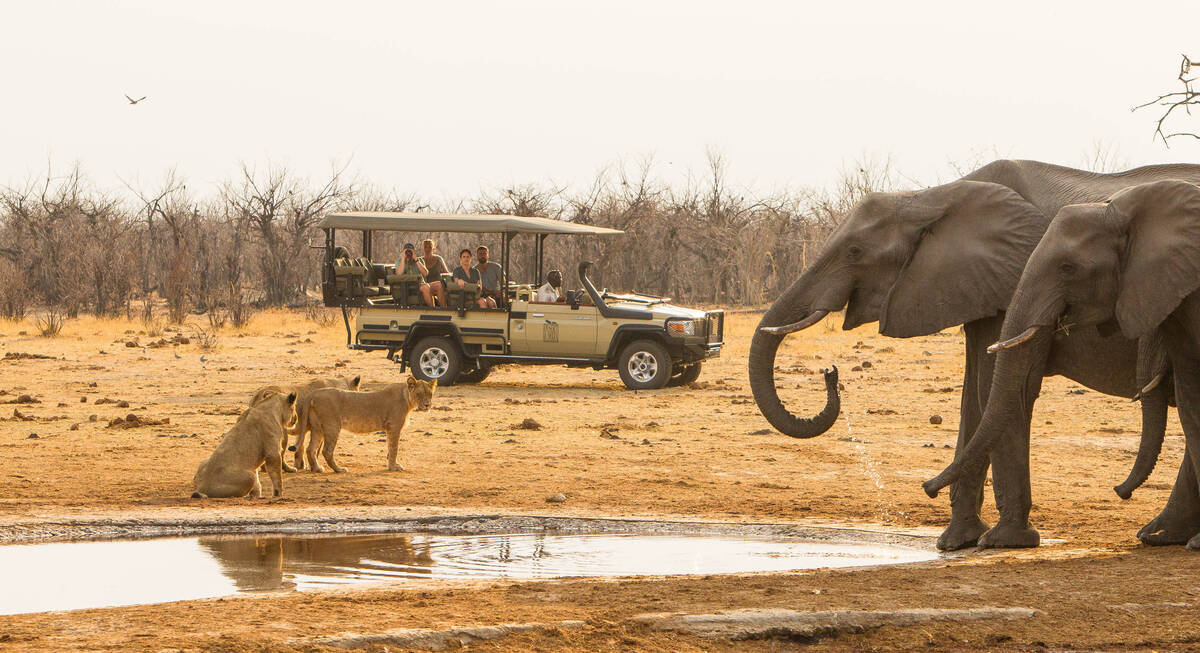
Spring Hare Safari
9 days • 3 locations
KASANE AIRPORT TO MAUN AIRPORT
An authentic and diverse safari to Botswana combining the Chobe Forest Reserve, Savuti Marshes and the Okavango Delta. Strong wildlife viewing, a variety of activities and excellent value camps.
US$8,710 - US$14,180 per person
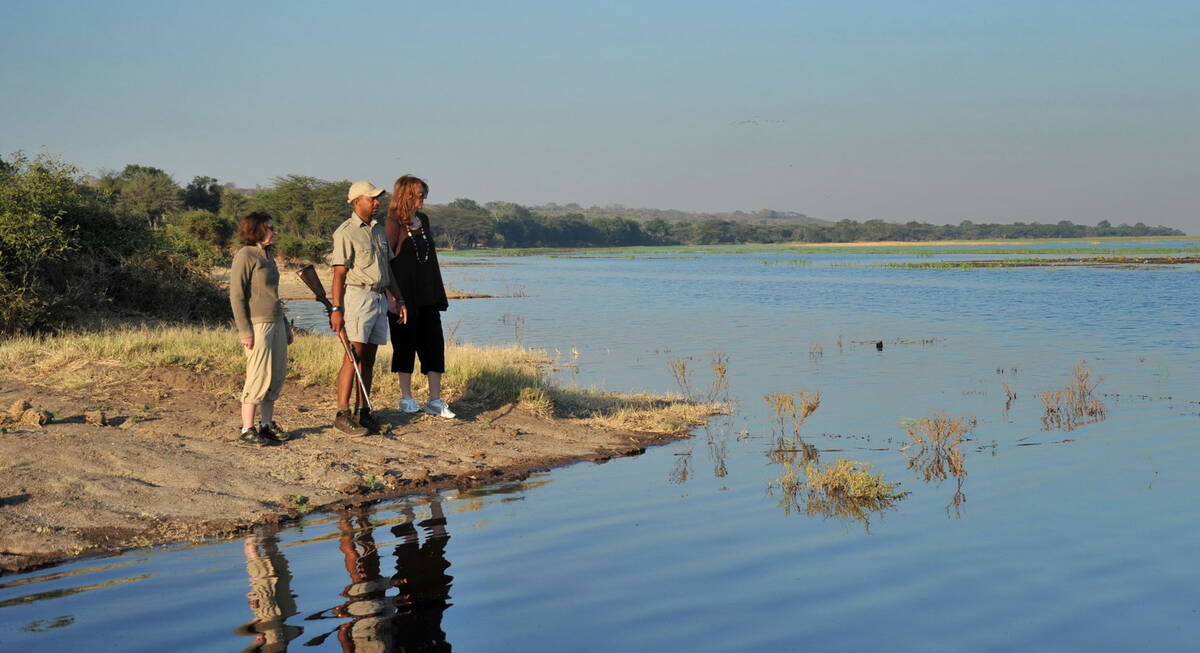
Wild Dog Safari
13 days • 5 locations
KASANE AIRPORT TO MAUN AIRPORT
An in-depth discovery of northern Botswana’s wilderness, from Chobe and the private Kwando Reserve to the Moremi and iconic Okavango Delta with a great variety of activities and wildlife.
US$12,930 - US$21,350 per person
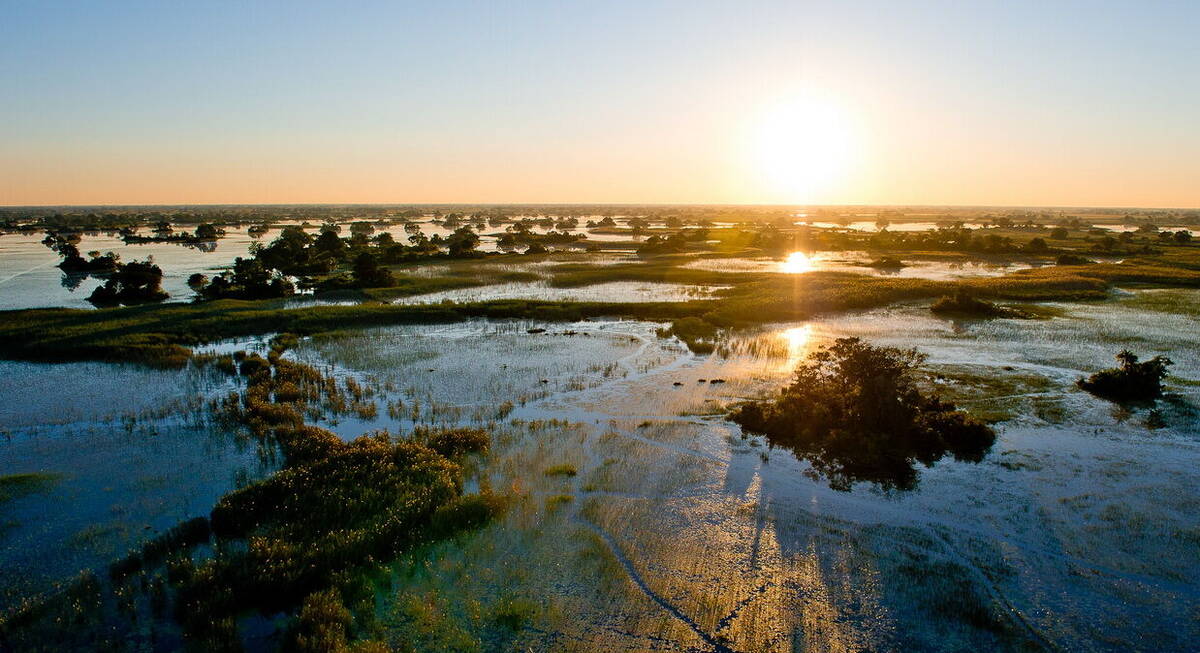
Steenbok Safari
9 days • 3 locations
MAUN AIRPORT TO MAUN AIRPORT
A classic Botswana safari exploring the Moremi, Chobe National Park and Okavango Delta. Excellent wildlife viewing and a variety of activities from three of our favourite traditional tented camps.
US$8,920 - US$13,480 per person
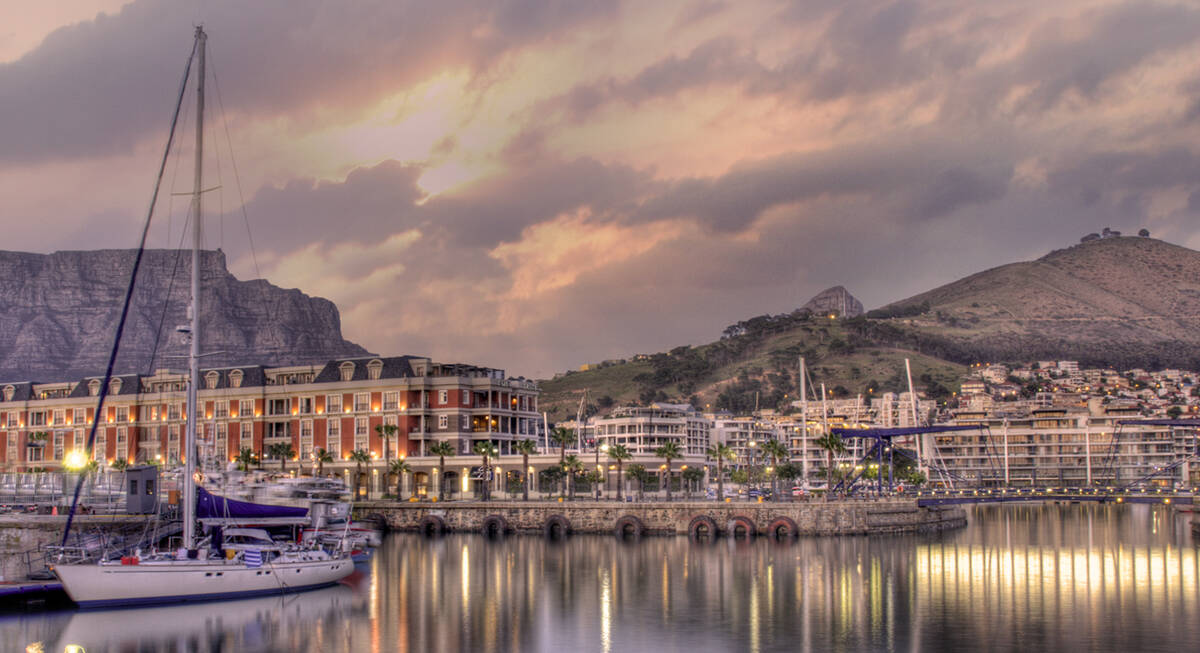
Leopard Safari
13 days • 4 locations
VICTORIA FALLS AIRPORT TO CAPE TOWN AIRPORT
Victoria Falls, Botswana and Cape Town – a classic southern African itinerary combining luxury, wilderness, safari and culture. We can't think of a better way to spend two weeks.
US$15,260 - US$18,150 per person
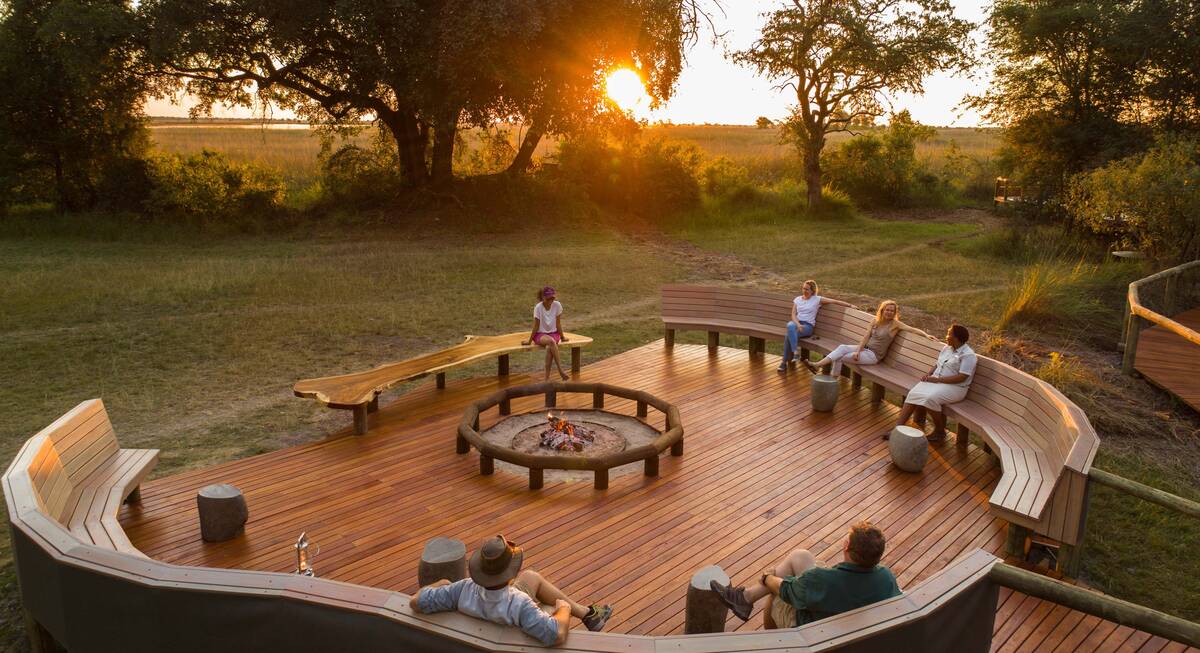
Wattled Crane Safari
5 days • 2 locations
MAUN AIRPORT TO MAUN AIRPORT
A good-value Botswana safari staying at comfortable lodges in prime wildlife-viewing areas – Chobe National Park and the Moremi Reserve in the Okavango Delta.
US$6,120 - US$8,090 per person
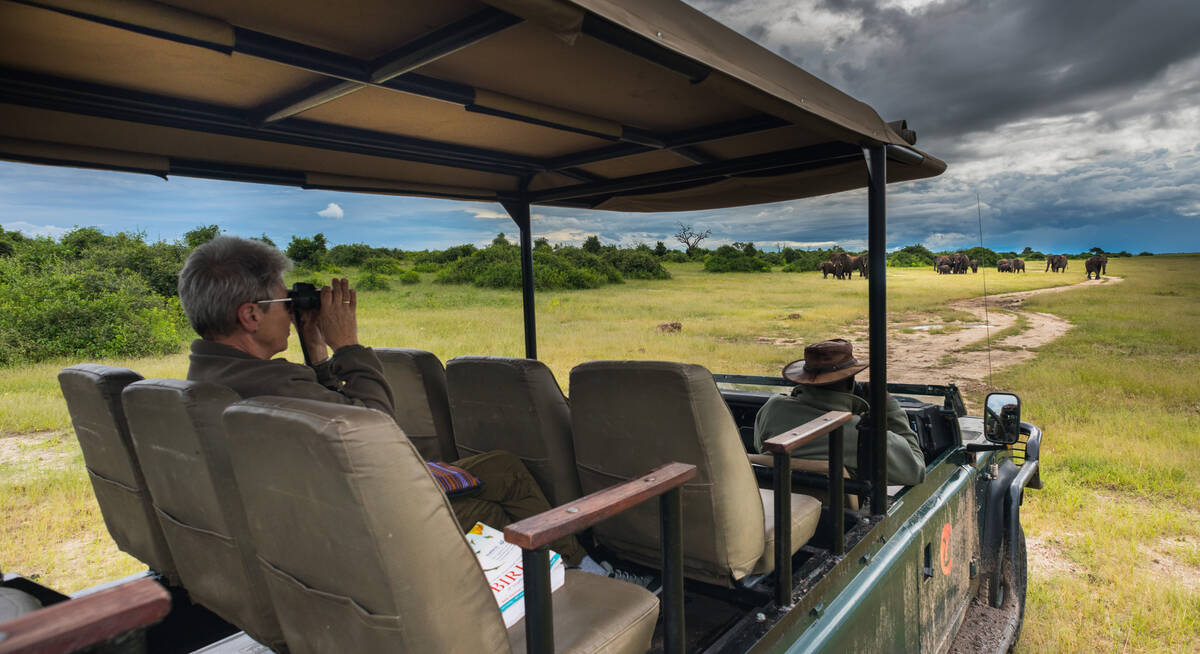
Pygmy Mouse Self-drive Safari
18 days • 10 locations
WINDHOEK AIRPORT TO VICTORIA FALLS AIRPORT
A truly epic southern African self-drive safari adventure from Namibia’s mountains and deserts, along the lush Caprivi Strip to Botswana and Victoria Falls in Zimbabwe, staying at luxury lodges throughout.
US$9,800 - US$10,560 per person
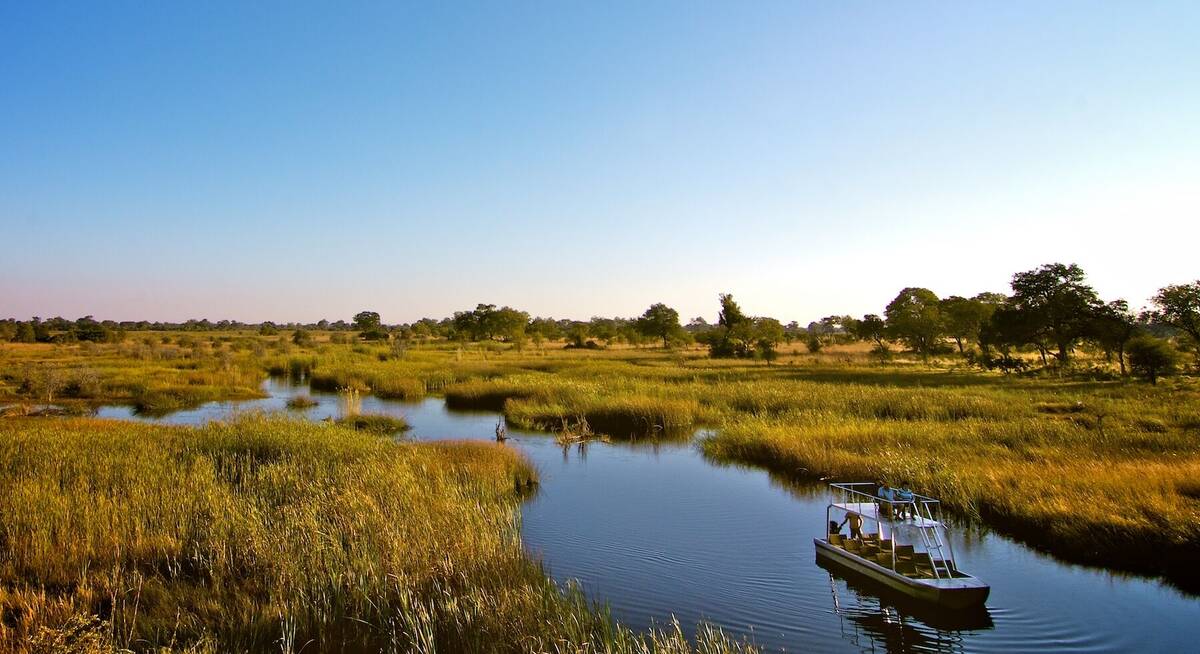
Sable Self-drive Safari
12 days • 7 locations
WINDHOEK AIRPORT TO VICTORIA FALLS AIRPORT
A great-value southern African self-drive adventure from Namibia along the Caprivi Strip to Botswana and Zimbabwe, combining other-worldly landscapes, unforgettable wildlife spectacles and rarely visited places, and ending at Victoria Falls.
US$8,530 - US$9,440 per person
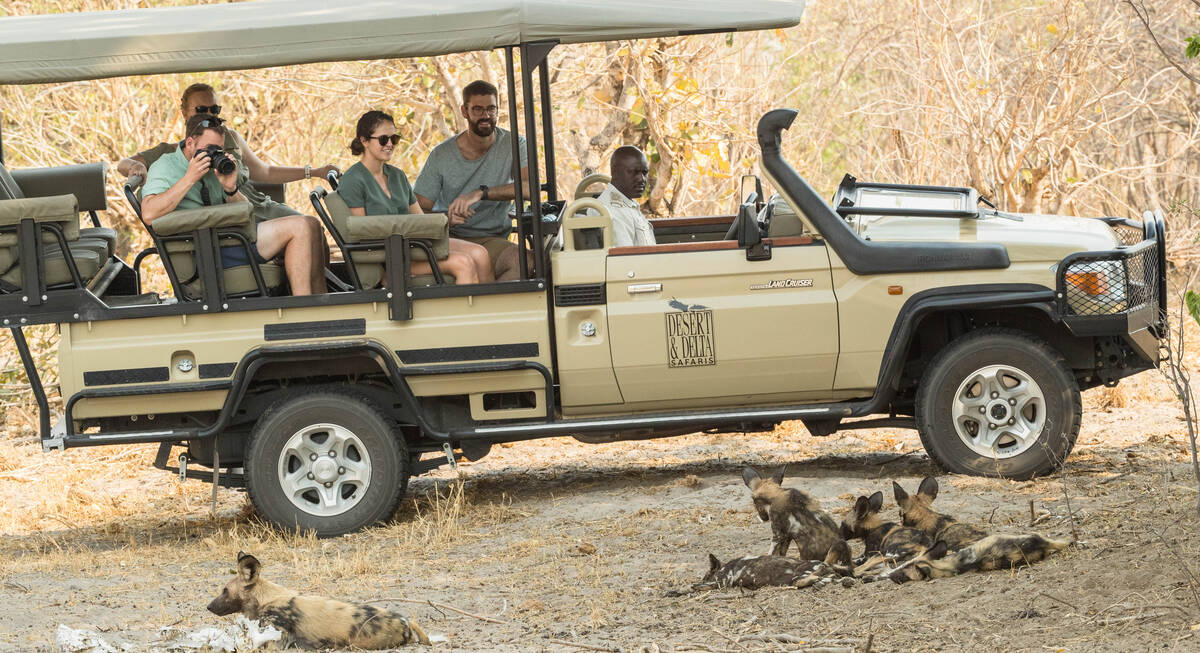
Porcupine Safari
11 days • 4 locations
MAUN AIRPORT TO MAUN AIRPORT
Visit dramatically contrasting landscapes boasting a variety of species during this exploration of Botswana’s top-safari destinations. A combination of national parks and private reserves allows for a range of activities.
US$11,780 - US$16,860 per person
Recent reviews of Chobe National Park safaris
We specialise in creating unforgettable Chobe National Park safaris, but don't just take our word for it – read what our travellers have to say. With 375 unedited reviews from Chobe safaris alone, you can trust in the genuine feedback from those who've experienced it.
Whether it's the impressive elephant herds along the Chobe River, the superb game-viewing experiences in Savuti, or the luxurious accommodation and expert guiding, Expert Africa travellers love Chobe.
"The highlight? Watching hundreds of elephants cross the Chobe River as we sipped cocktails from our boat."
"From the moment we arrived, the service, wildlife, and experience were perfect."
Read their unedited reviews about tailor-made Chobe safaris, then let us create the perfect Chobe safari for you too!
Arrived 3 Jun 2025, 5 nights
"Botswana Chobe 3-day safari"
Overall rating: Excellent
Arrived 21 May 2025, 15 nights
"My May 2025 trip"
Overall rating: Good
Arrived 19 May 2025, 13 nights
"A Wonderful trip to Namibia & Botswana "
Overall rating: Excellent
Arrived 6 May 2025, 8 nights
"My May 2025 trip"
Overall rating: Excellent
Arrived 4 May 2025, 11 nights
"My May 2025 trip"
Overall rating: Excellent
Arrived 15 Mar 2025, 20 nights
"My March 2025 trip"
Overall rating: Excellent
Arrived 22 Dec 2024, 14 nights
"My Dec 2024 trip"
Overall rating: Excellent
Arrived 7 Nov 2024, 11 nights
"Our Nov 2024 Botswana trip"
Overall rating: Excellent
Arrived 6 Nov 2024, 11 nights
"My Nov 2024 trip"
Overall rating: Excellent
Arrived 4 Nov 2024, 14 nights
"My Nov 2024 trip"
Overall rating: Excellent
The best Chobe camps and lodges
There’s a wide range of places to stay both inside and bordering Chobe National Park.
Chobe Game Lodge, the only permanent lodge inside the park, provides eco-luxury and riverfront views, whilst nearby Chobe River Lodge allows guests to relax while watching wildlife from the lodge’s scenic riverbank setting.
For those seeking a quieter retreat, Ngoma Safari Lodge and Muchenje Safari Lodge offer breathtaking views over the Chobe River floodplains from their elevated positions, and a more intimate, secluded feel.
Further south in Savuti, lodges like Savute Safari Lodge and private mobile camps immerse guests in a raw, predator-rich wilderness, making for a truly authentic bush experience.
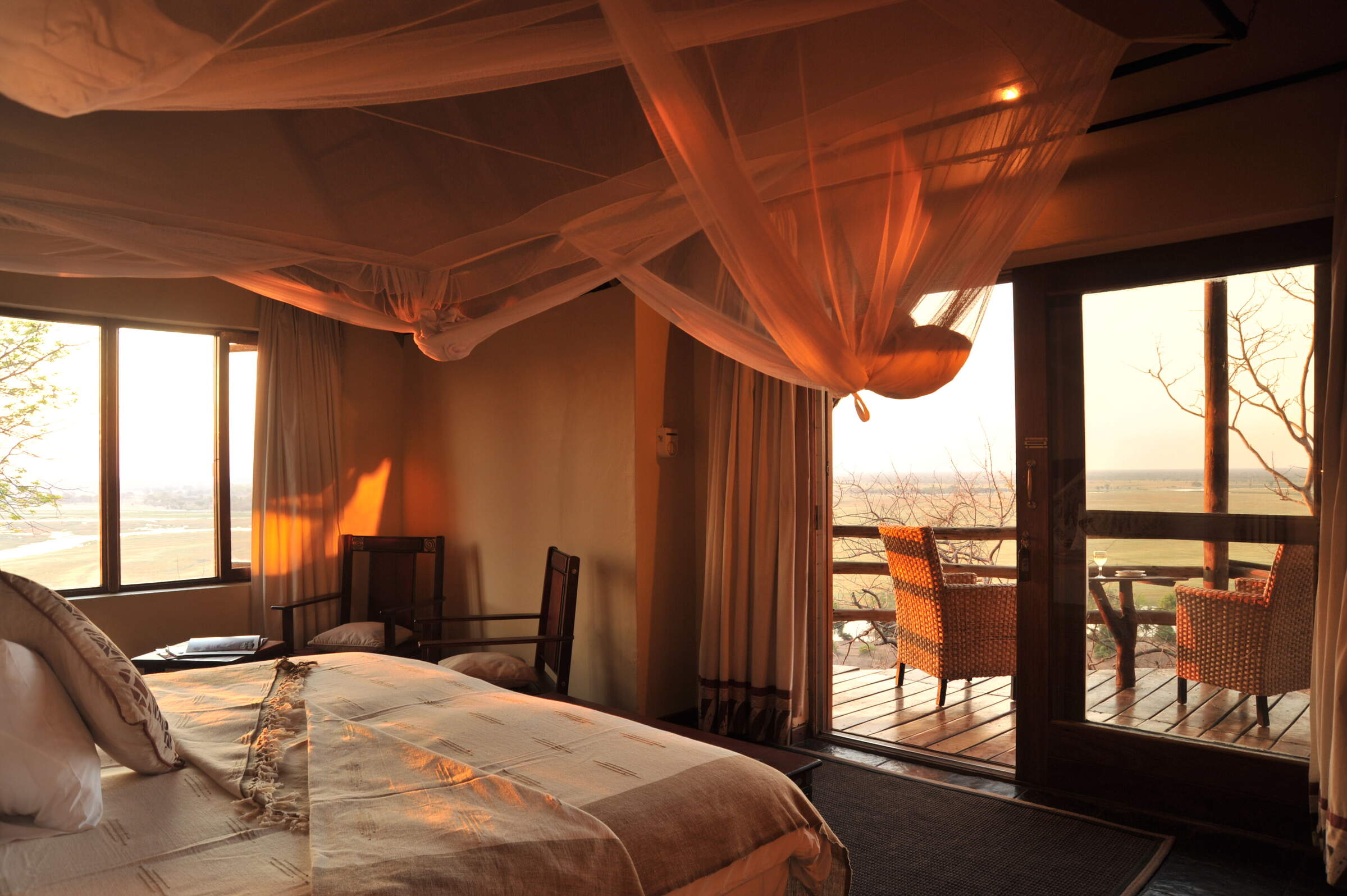
Muchenje Safari Lodge
One of our favourites in the area, Muchenje is a small, welcoming lodge at the quieter, western end of the Chobe Riverfront.
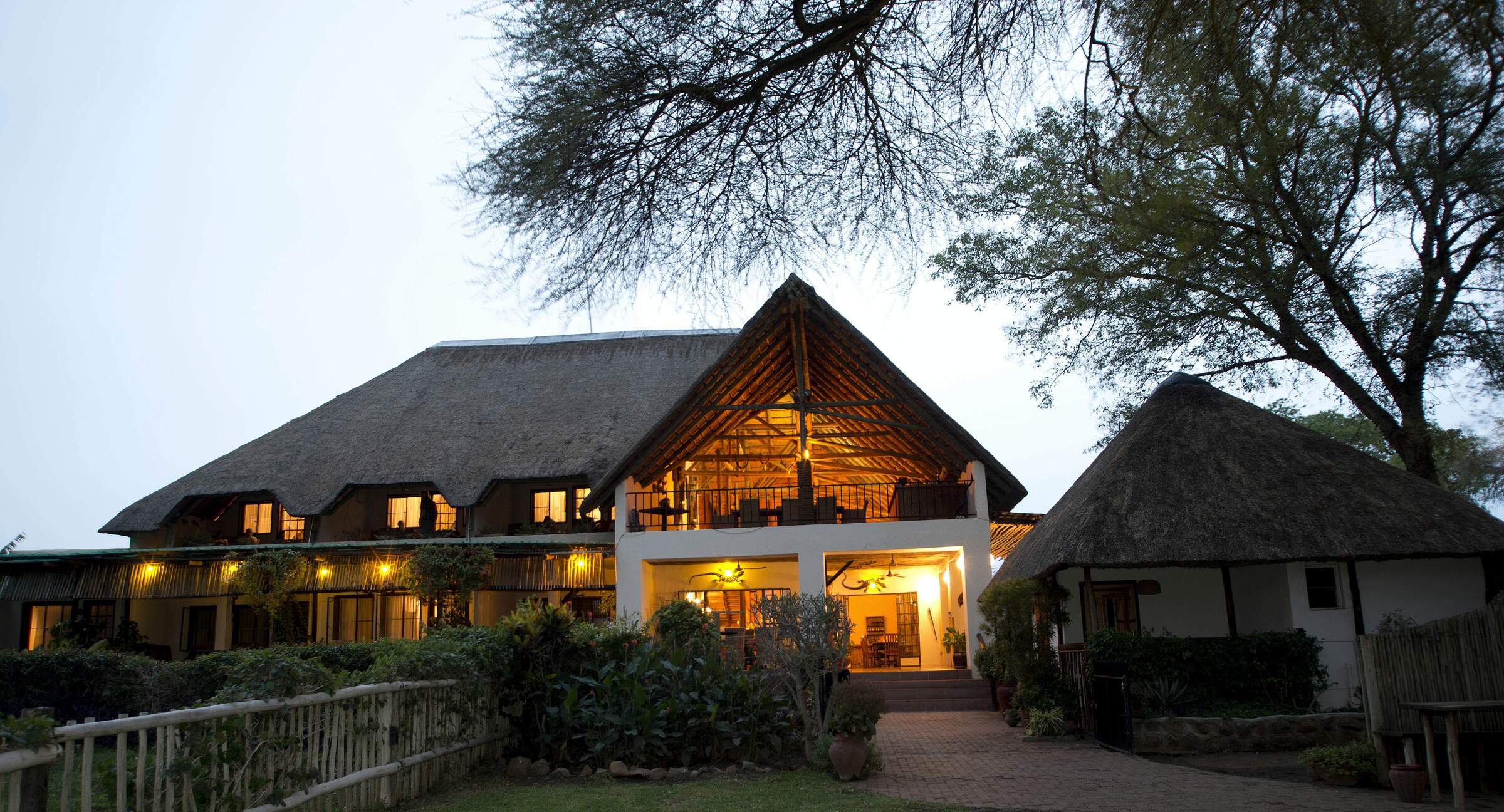
Chobe River Lodge
Overlooking the Chobe River, the intimate Chobe River Lodge is a haven of tranquillity away from the bustle of Kasane.
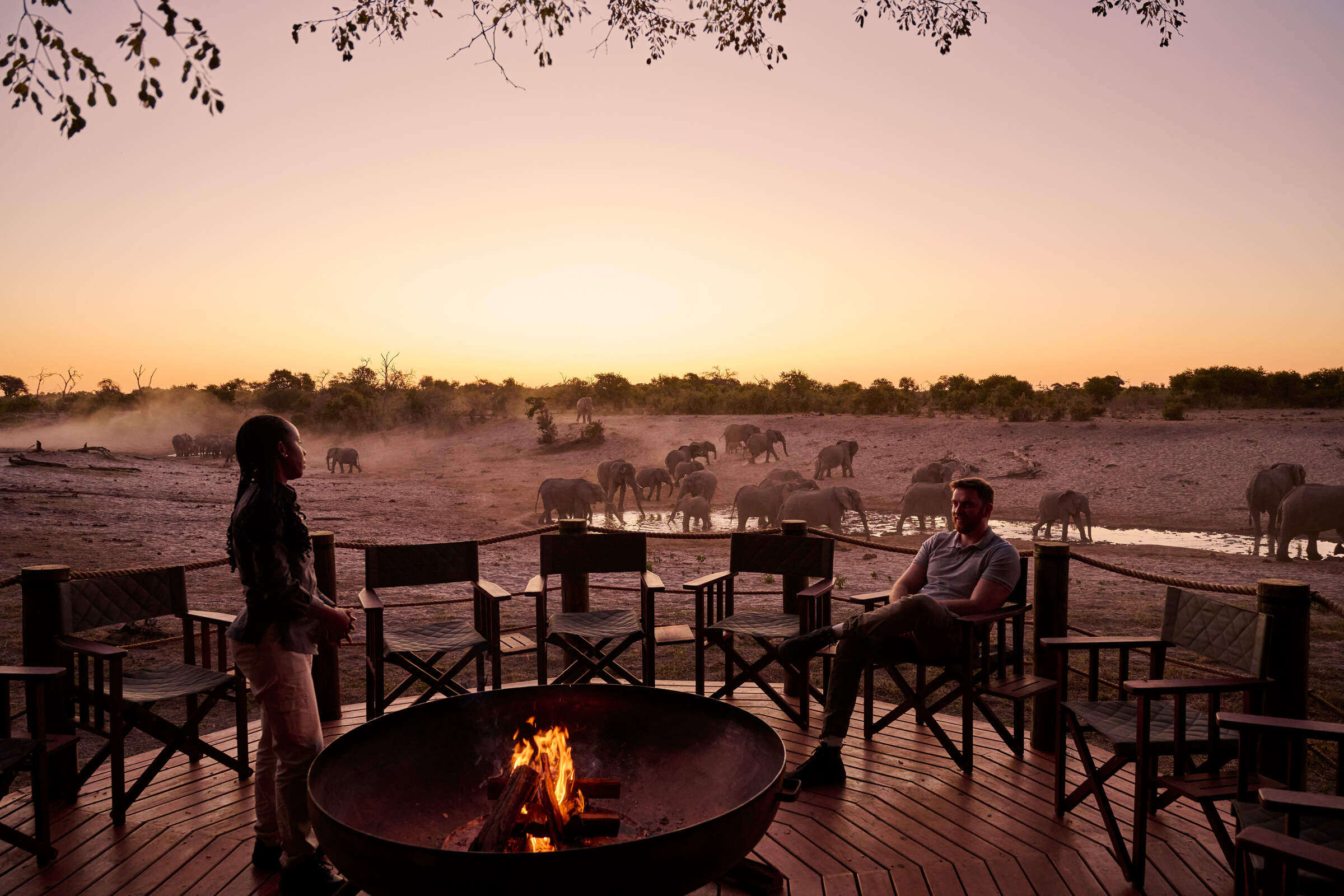
Savute Safari Lodge
Savute Safari Lodge sits on the banks of the Savuti Channel within Chobe National Park, and offers access to excellent game viewing, especially during the dry season.
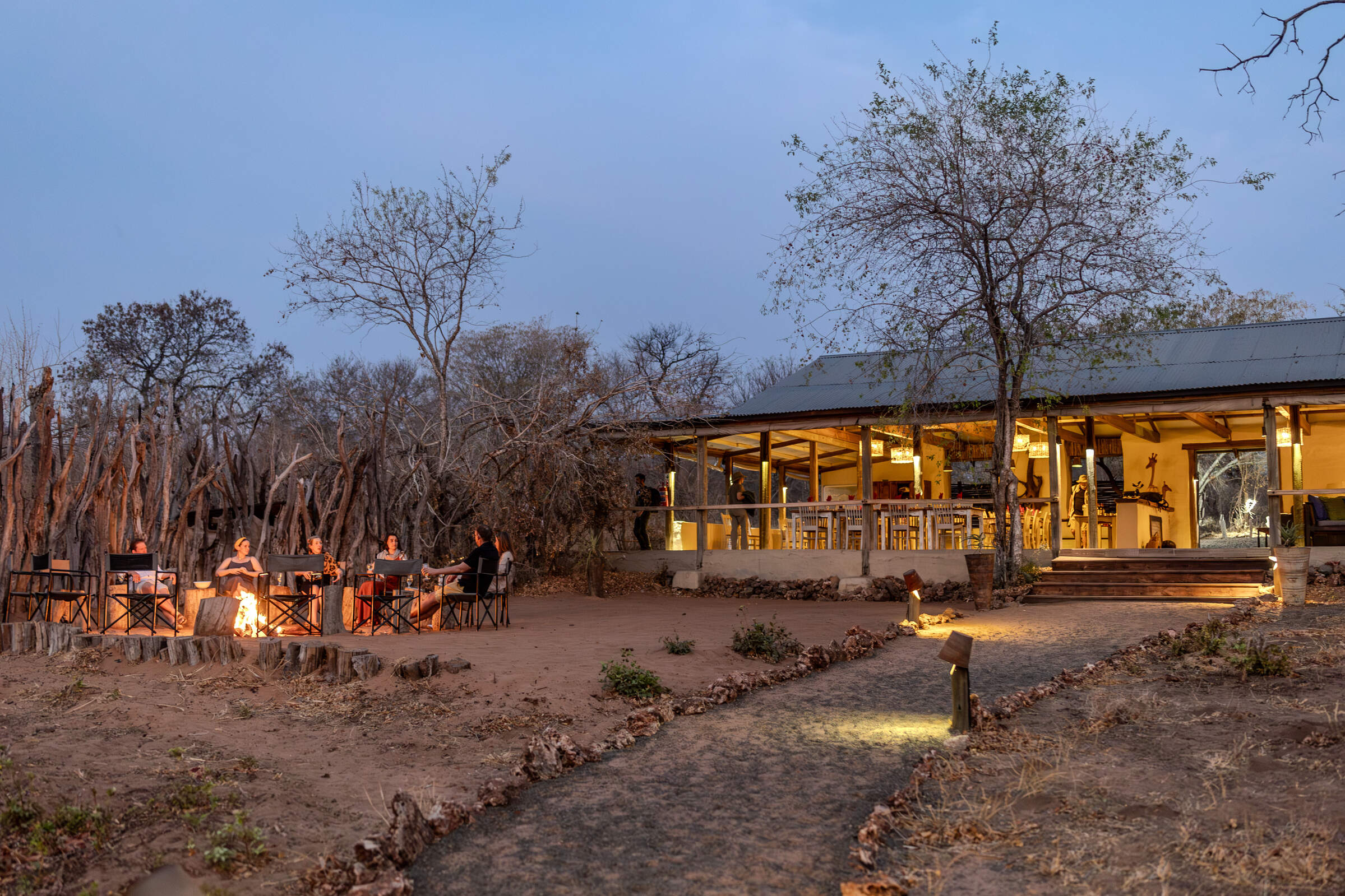
Chobe Elephant Camp
Located in one of our favorite areas of Chobe National Park, Chobe Elephant Camp is a simple but well-appointed camp with a strong bush feel.
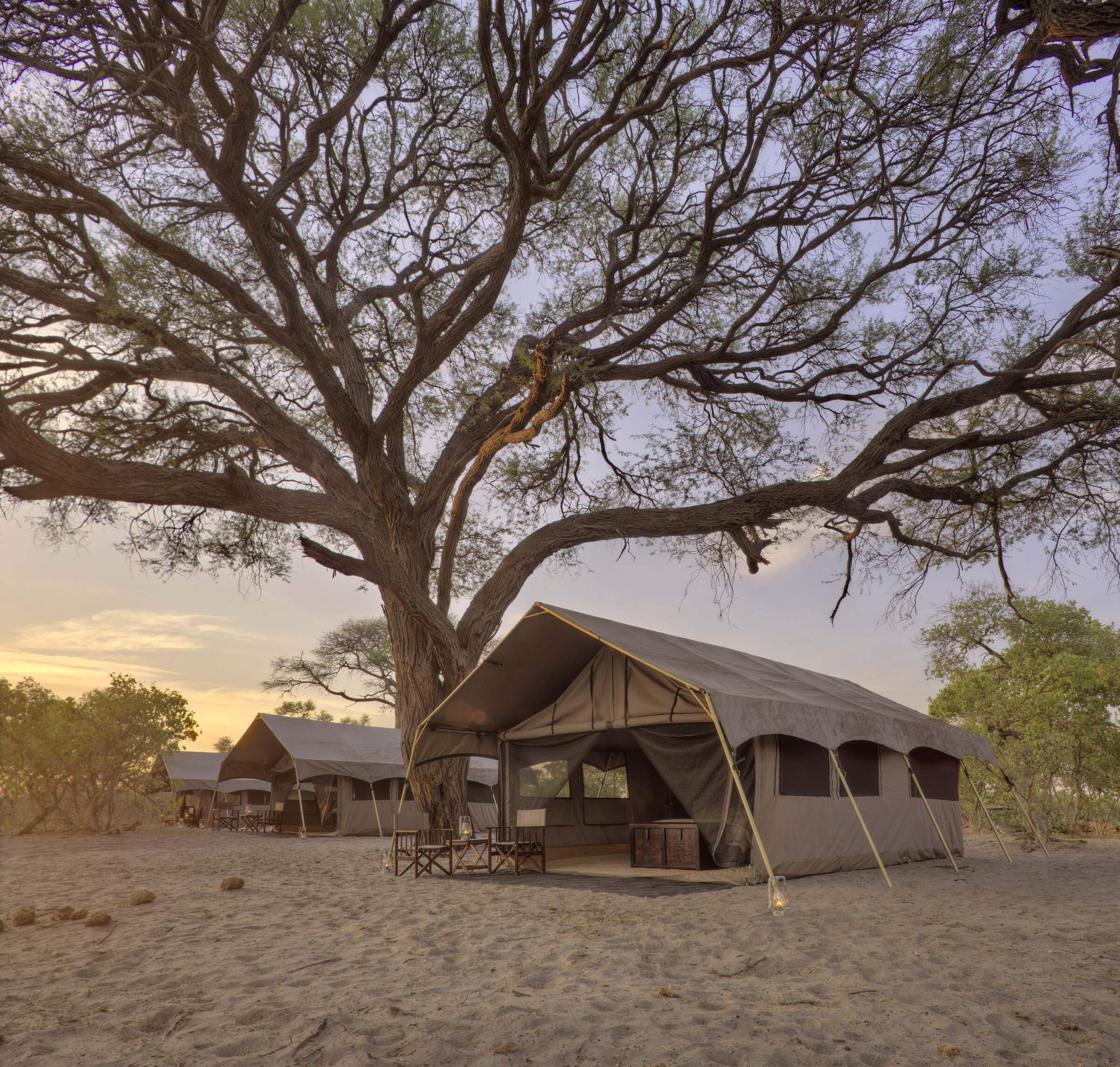
Savute Under Canvas
A mobile camp with the comforts of a semi-permanent tented camp, Savute Under Canvas offers guided game drives within the Savuti region of Chobe National Park.
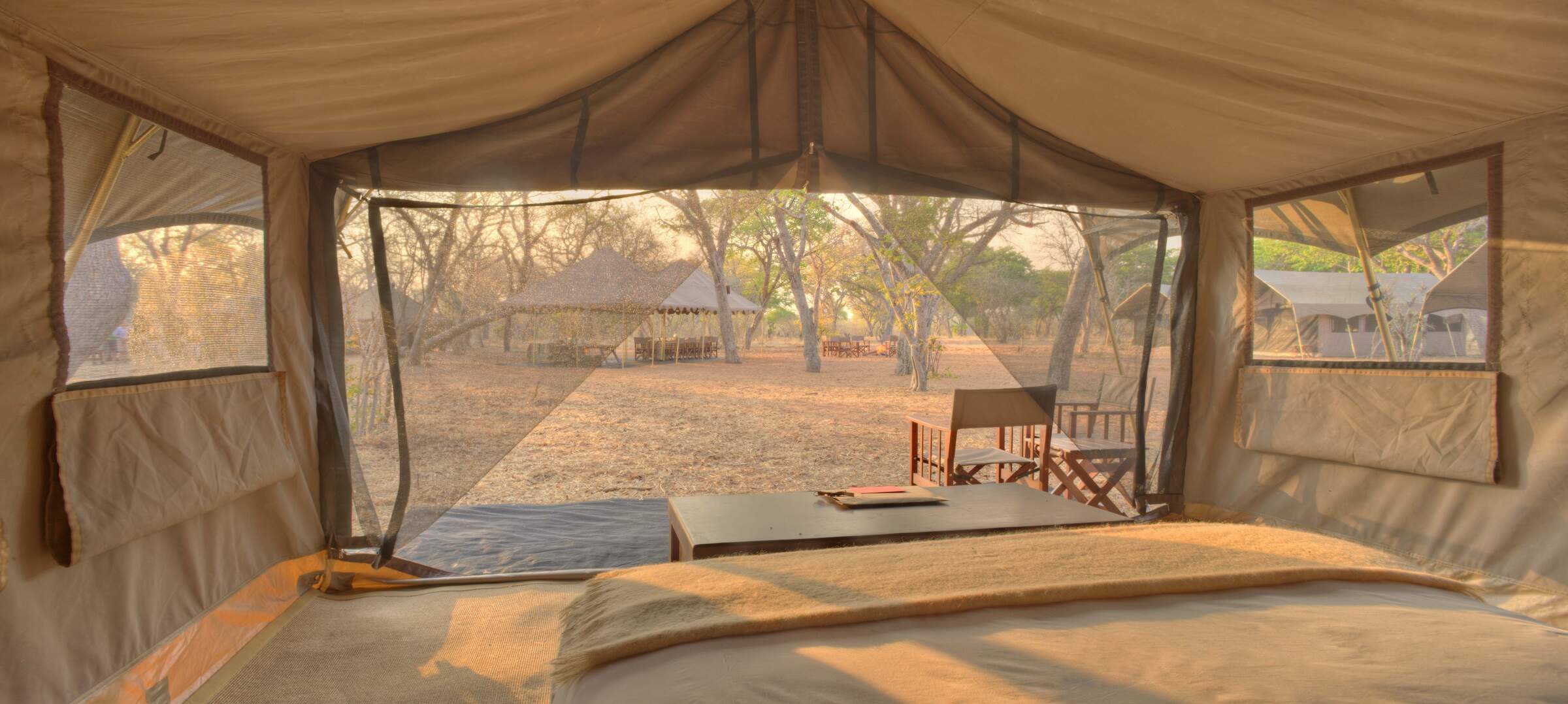
Chobe Under Canvas
This is a typical location for Chobe under Canvas, a small, semi-permanent camp in the Chobe Riverfront area that offers good value for money and high standards of care.
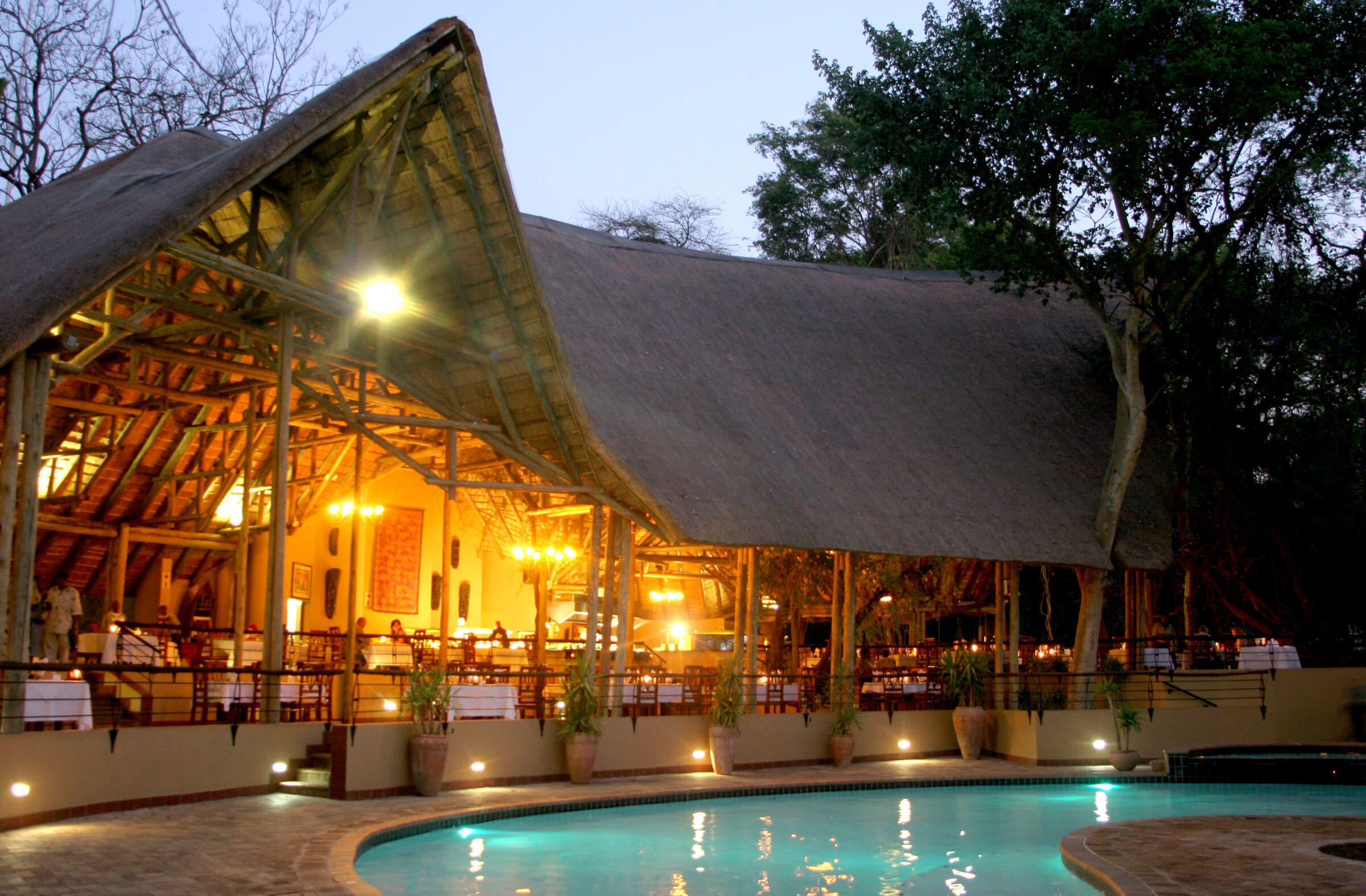
Chobe Safari Lodge
Chobe Safari Lodge is a good value, hotel-style lodge in the heart of Kasane offering game drives, boat cruises and fishing trips.
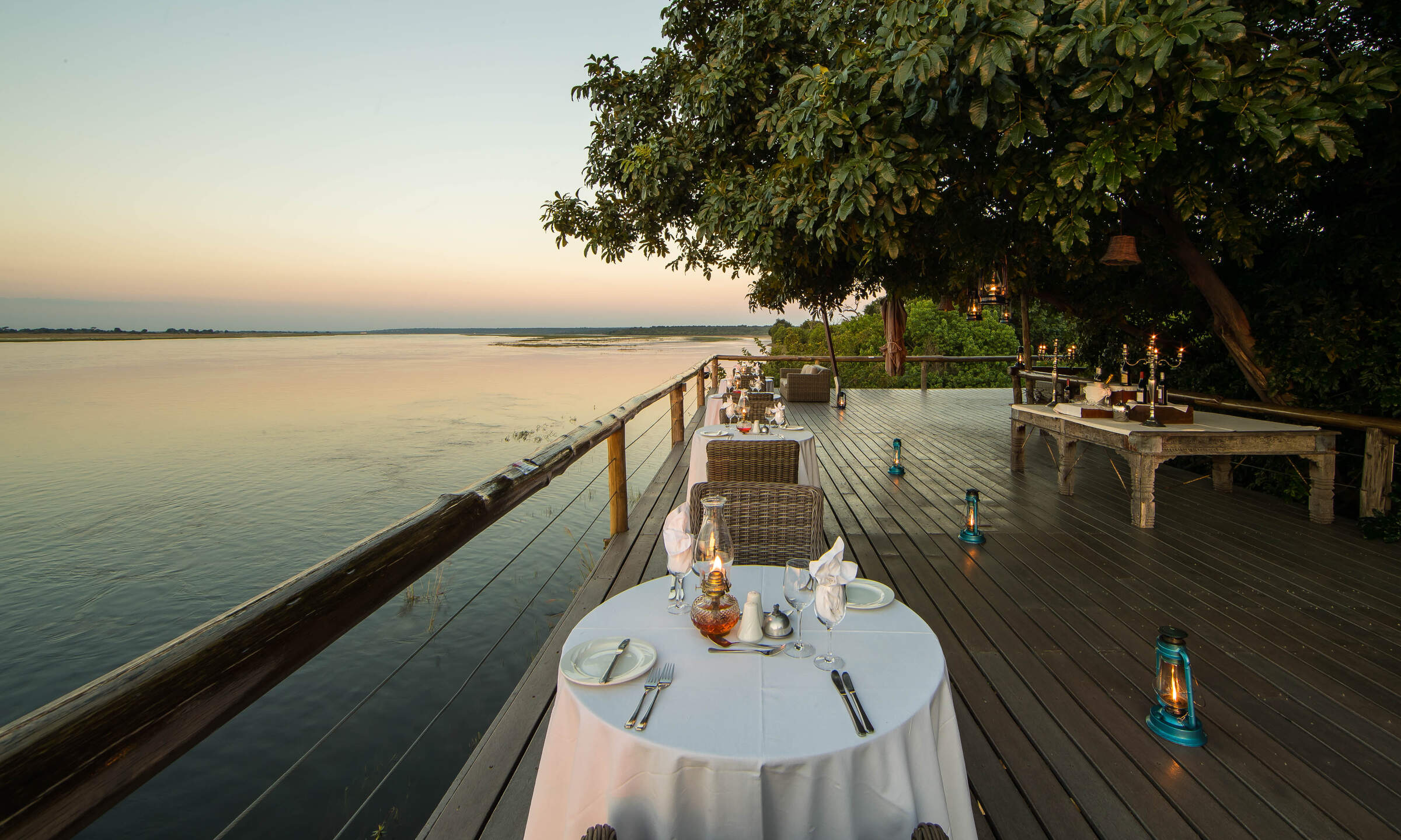
Chobe Game Lodge
Chobe Game Lodge occupies an enviable riverfront location within Chobe National Park and boasts well-earned 'eco' credentials, as well as an excellent all-female guiding team.
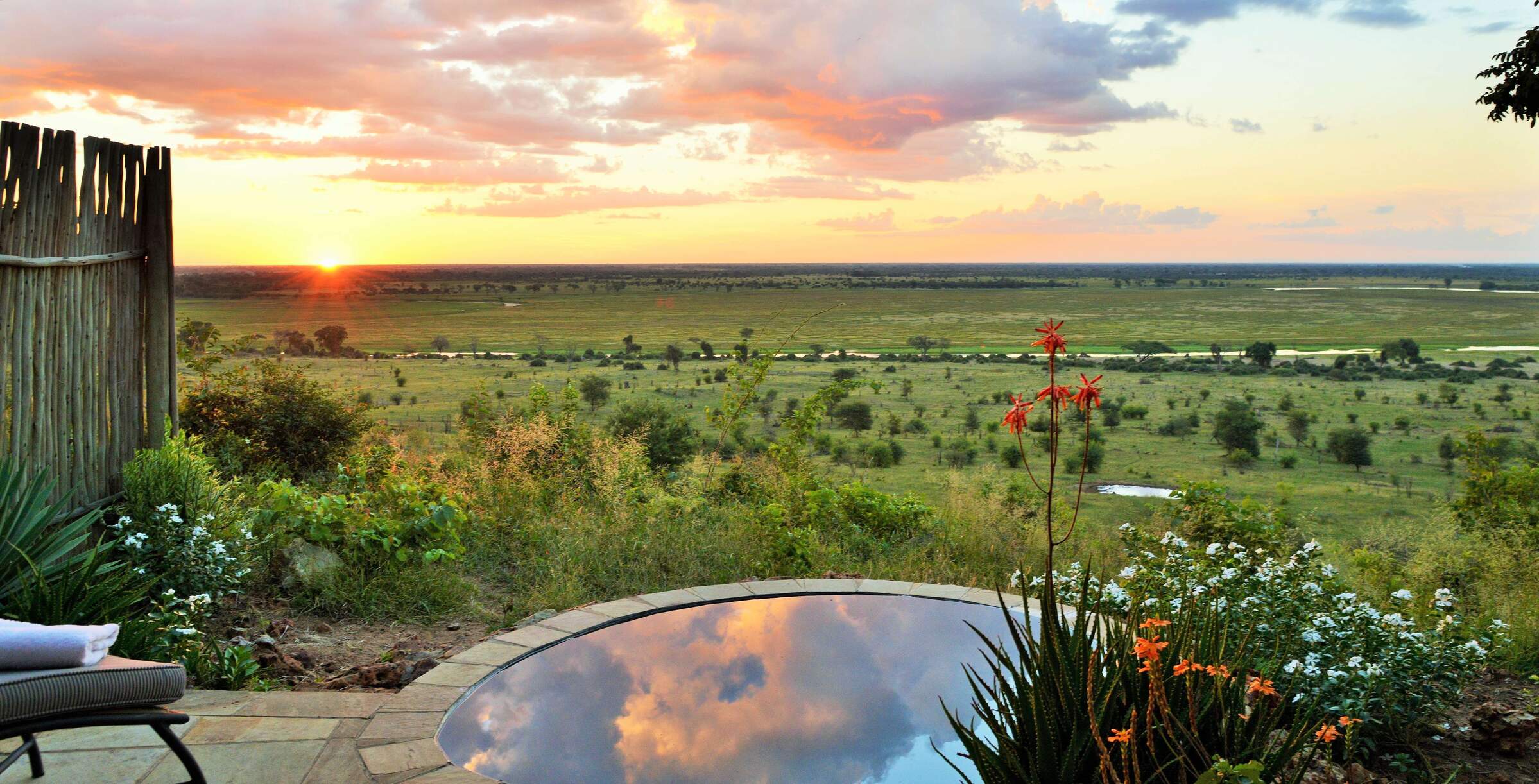
Ngoma Safari Lodge
With sweeping views across the floodplains of the Chobe River, Ngoma offers superb food and flexible safari activities.
Closed for refurbishment 5 Jan - 28 March 2026
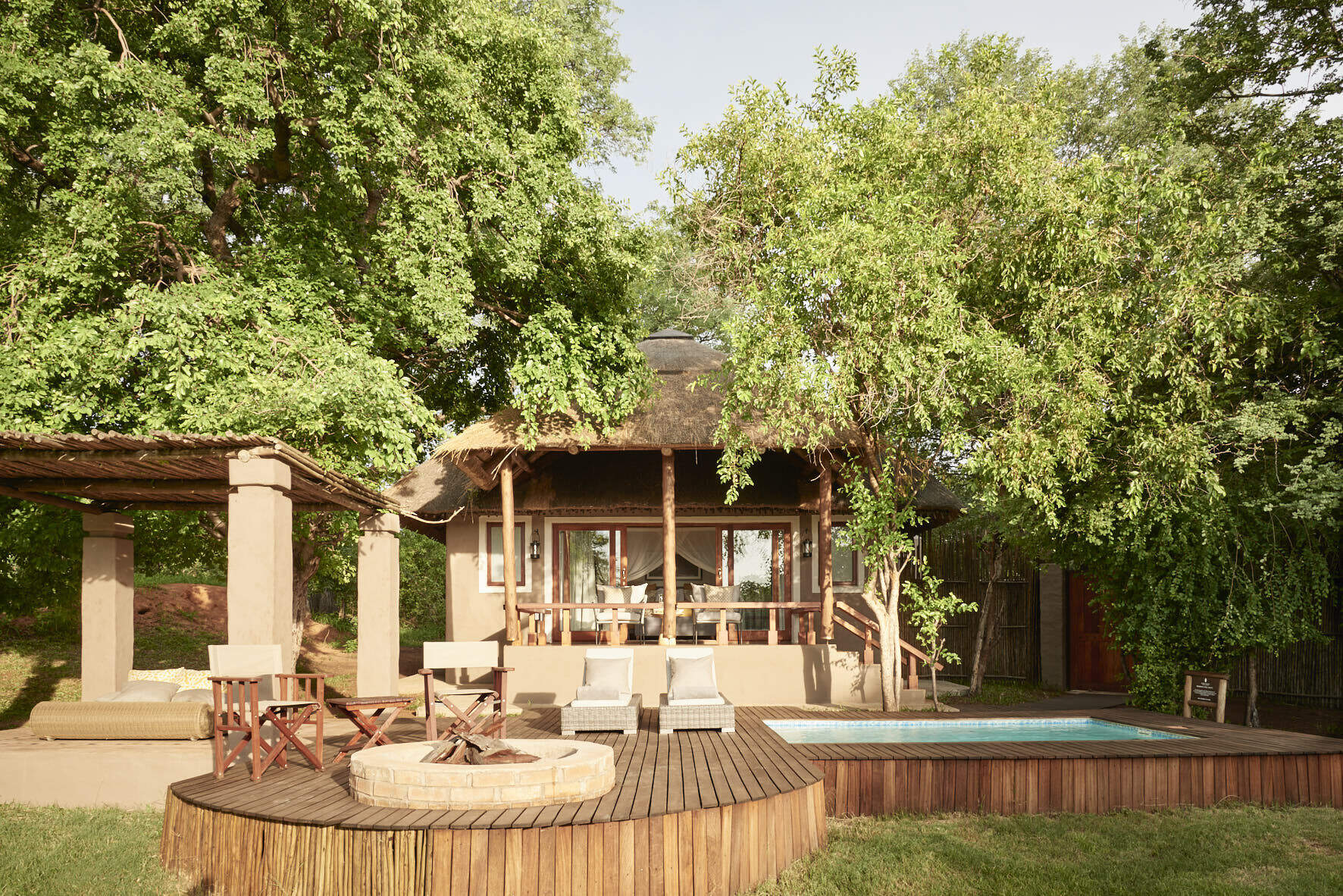
Chobe Chilwero
On the periphery of Chobe National Park, Chobe Chilwero offers luxurious surroundings and excellent food, which complement superb game viewing on game drives and boat trips.
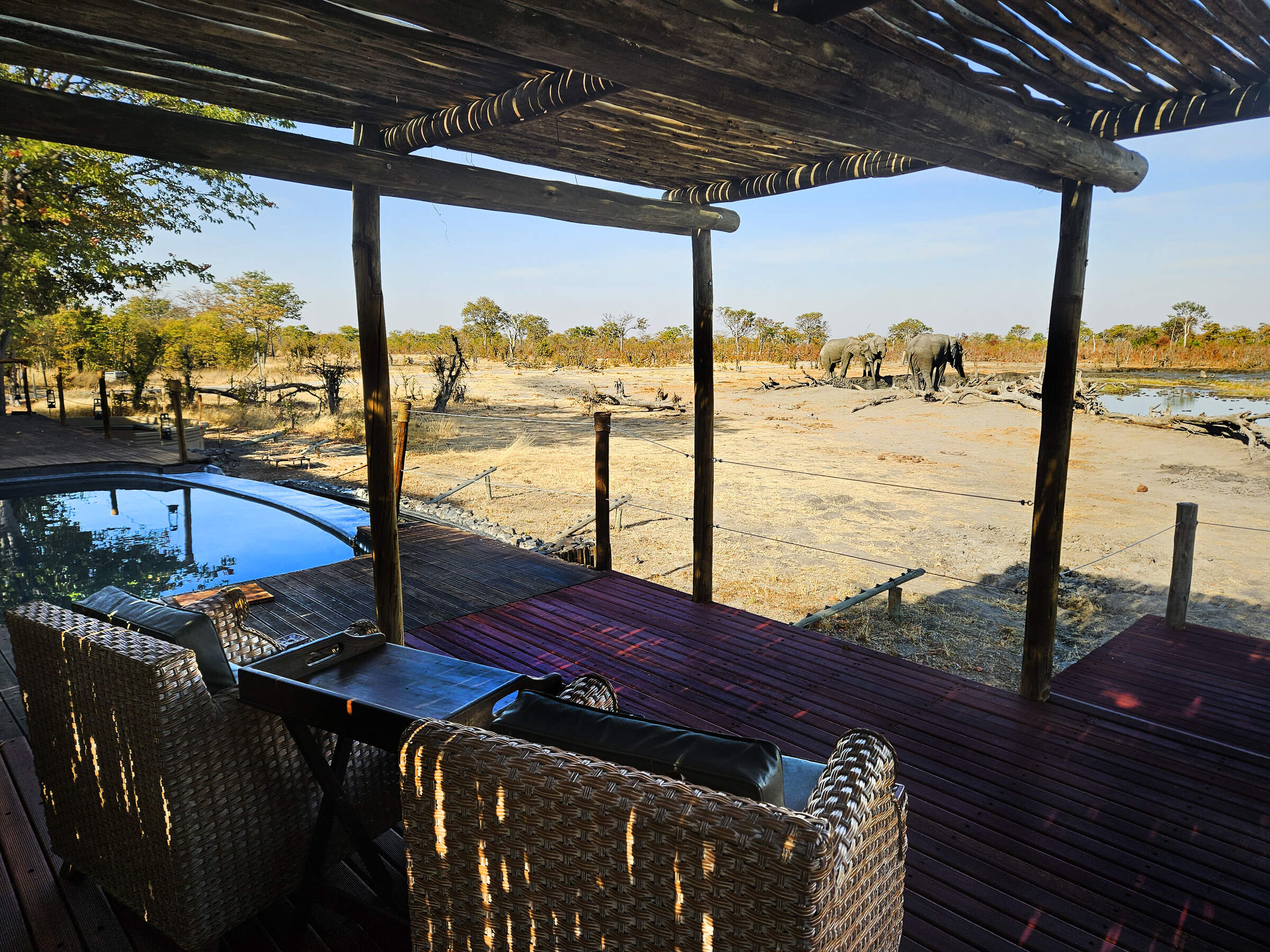
Camp Kuzuma
Camp Kuzuma sits in the Kazuma Forest Reserve and is an excellent place to see elephant in particular. Away from the busier riverfront area of Chobe National Park this camp offers a luxurious base form which to explore this less visited region of northern Botswana.
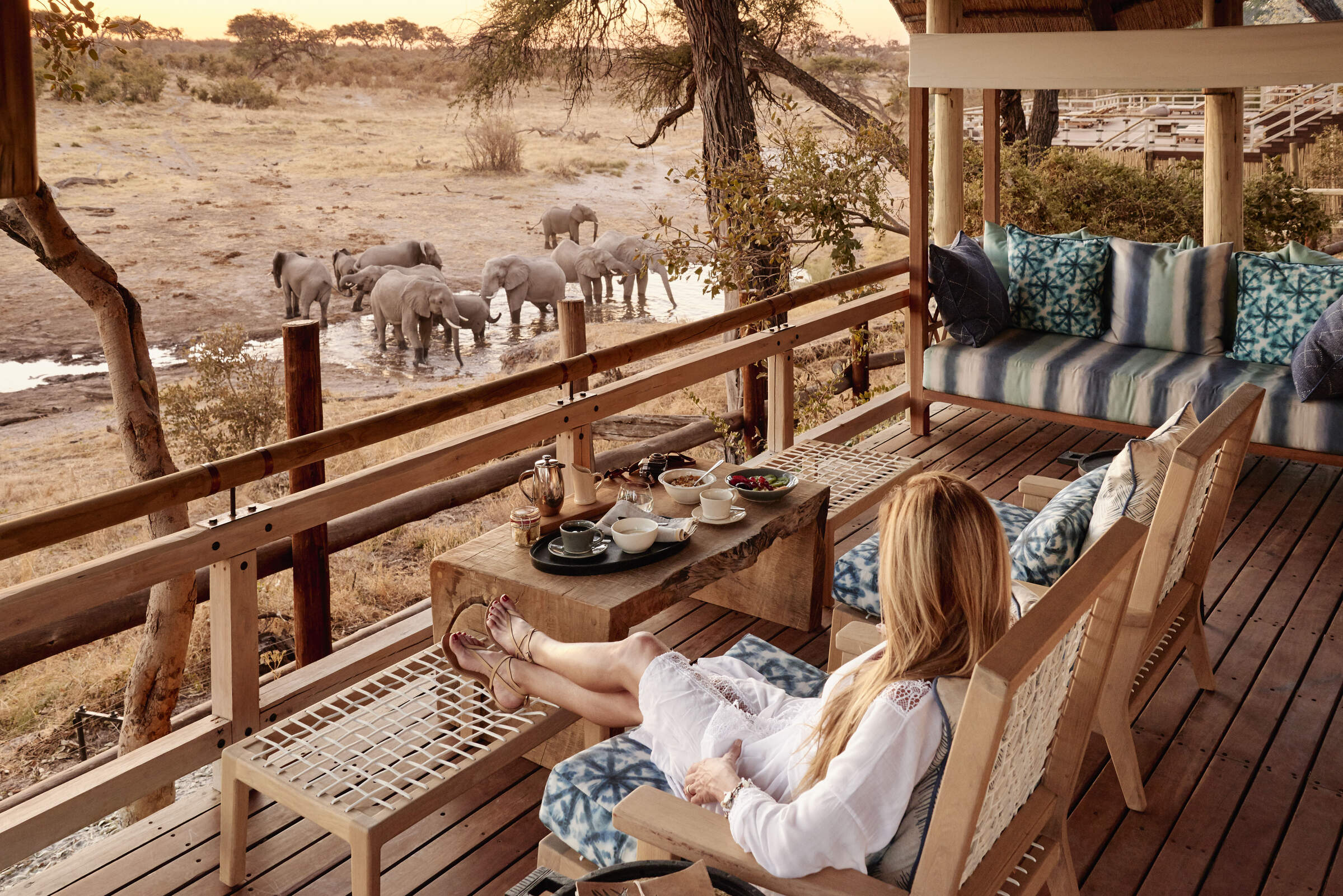
Savute Elephant Lodge
Savute Elephant Lodge is a luxurious camp on the banks of the now flowing Savuti Channel. This is a classic big-game area, although its location within Chobe National Park does limit the activities which are possible here.
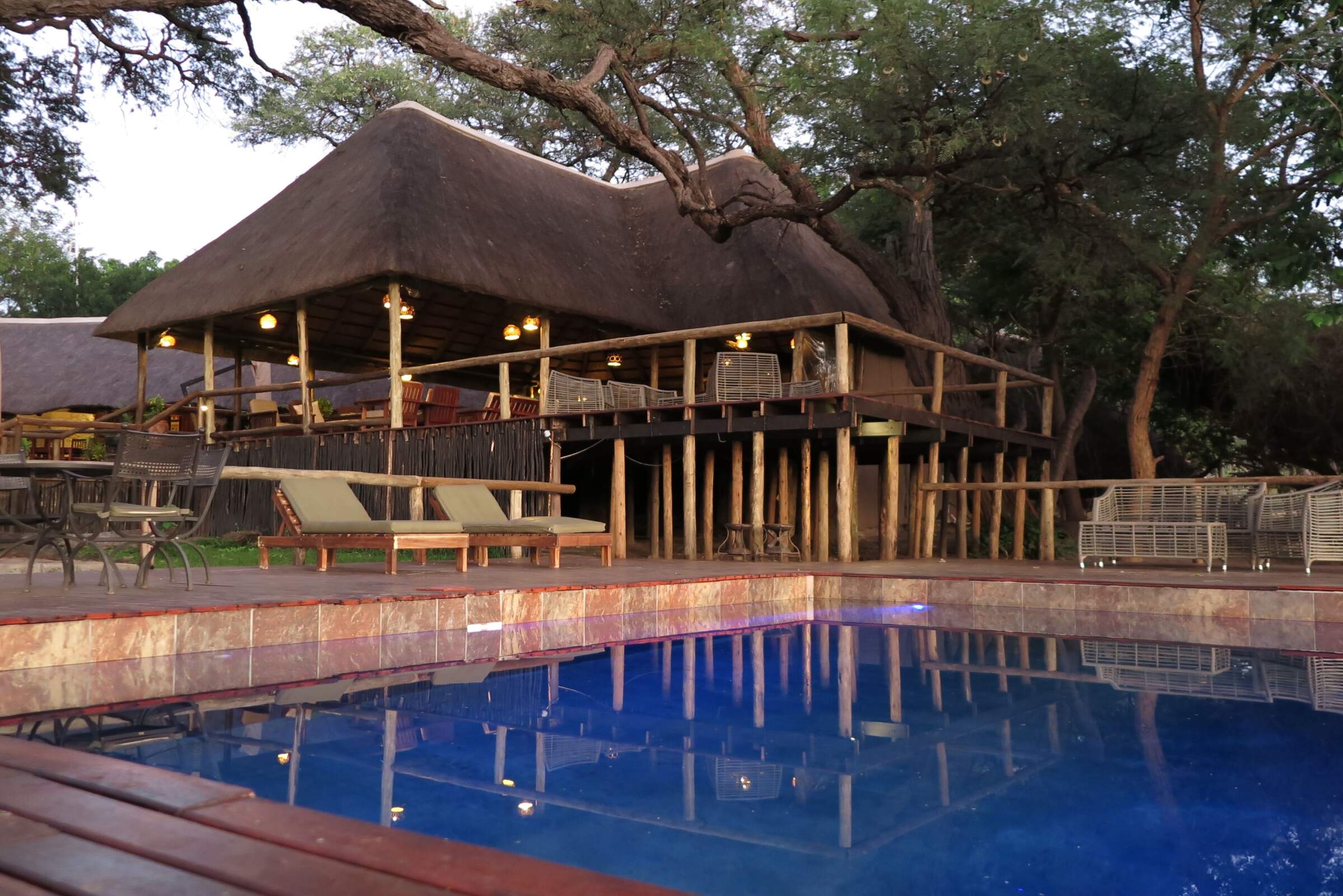
Elephant Valley Lodge
Elephant Valley Lodge is a lovely camp in a beautiful setting – sit in its hide and watch the wildlife come to drink at the waterhole. Activities focus on boating and drives in Chobe which - although very busy, and a long drive from the lodge – is very rich in wildlife.
Chobe’s wildlife hotspots
Chobe is home to one of the highest concentrations of elephants on Earth: the herds sighted here can be truly spectacular.
But Chobe’s other wildlife is prolific too. Whether you're hoping to watch wild dogs on the hunt or witness Savuti’s iconic lion-buffalo battles, Expert Africa can help you find the best safari spots.
Our citizen science project has been collecting real-time wildlife sightings data since 2018. With thousands of wildlife surveys across Chobe National Park, we offer up-to-date insights on where to see key mammals. This data allows us to provide tailored safaris with the best opportunities to see Africa’s finest wildlife.
Click on an animal below for the latest sightings.

99% success

99% success

92% success

91% success

91% success

91% success

55% success

51% success

46% success

42% success

40% success

26% success

20% success

14% success

8% success

5% success

2% success

2% success
The best time to visit Chobe National Park
Chobe National Park experiences distinct seasonal changes.
The dry season (May to October) brings cooler temperatures and clear skies. Wildlife congregates around the Chobe River as water become scares elsewhere, offering excellent game viewing and especially large elephant herds. At this time, the Savuti area becomes a hotspot for predator-prey interactions.
The green season (November to April) sees warmer temperatures and occasional thunderstorms. The rain transforms the landscape, with plains and trees becoming lush and green. Increased vegetation can make wildlife sightings more challenging but the scenery is gorgeous and the photography vibrant. This period is ideal for birdwatching, particularly in the Linyanti Marsh area, where migratory species arrive. Elsewhere, the Savuti Marsh attracts a variety of herbivores, including the dramatic zebra migration.
Jan
Feb
Mar
Apr
May
Jun
Jul
Aug
Sep
Oct
Nov
Dec
Chobe National Park in January
January marks the peak of the rainy season in Chobe National Park. Evening rains are typically brief but heavy, often accompanied by thunderstorms. While temperatures remain high, they are slightly cooler compared to earlier months. Wildlife tends to be more dispersed, making it harder to spot animals. Big game densities near the Chobe Riverfront are relatively low, but some resident species, like giraffes, are accustomed to vehicles and can appear so relaxed that they seem almost tame.
The Savuti Marsh becomes lush and green, attracting herbivores. Migratory birds abound throughout the park, with the Linyanti Marsh being particularly rich in birdlife during this period. January is an excellent time for visitors interested in lush landscapes and diverse birdlife. Lower rates at many lodges make this a good time to visit on a more moderate budget.
- Warm temperatures with occasional thunderstorms
- Birdlife at its most spectacular in Chobe
- Big game dispersed across the park
- Seek most wildlife away from the river
- Good availability and rates in Chobe’s lodges and camps
Our view
A good time to visit, with pros & cons
Weather in January
Chobe National Park in February
February in Chobe National Park is similar to January, with heavy rains most days, often towards evening. The landscape is green and alive, with insects and smaller animals more easily seen. Many birds and animals are raising their young, especially in the Linyanti and Savuti areas, making for lovely family group sightings. The Chobe River swells, creating a spectacular landscape and attracting diverse wildlife. However, the rains create pools and waterholes in the bush, which combined with thicker vegetation makes it harder to spot larger animals.
The Chobe Riverfront area still offers a good wildlife experience as although much big game has moved away, the animals that remain are often more relaxed. Boat cruises on the Chobe River provide excellent opportunities to observe wildlife from a different perspective. Visitor numbers remain low, with good rates and more availability in camps and lodges.
- Warm with occasional thunderstorms in Chobe
- Vegetation running riot; smaller wildlife thriving
- Many animals with young in the park
- Big game dispersed throughout Chobe
- Low visitor numbers, good camp availability
Our view
This is not a great time to visit
Weather in February
Chobe National Park in March
March typically marks the end of the main rainy season in Chobe National Park, with showers gradually tapering off. Many days are characterised by clear skies, intense sunshine, and rising temperatures. Short afternoon thunderstorms may still occur, while the park's landscape remains lush and vibrant. During this time, many birds and animals complete the process of raising their young. The Savuti Marsh area becomes particularly fascinating as predators exploit the vulnerability of the young and weaker prey.
The Chobe River levels start to stabilise, offering excellent boat safari opportunities. March can also be a good time to explore the Linyanti area, where many animals congregate as other water sources begin to dry up. With fewer visitors in most areas, rates are still be relatively low at lodges and safari camps.
- Variable weather, rains tailing off in Chobe
- Occasional small thunderstorms in the park
- Many animals finish raising young in Chobe
- Birdlife still spectacular along Chobe River
- Few tourists, often lower rates in lodges
Our view
A good time to visit, with pros & cons
Weather in March
Chobe National Park in April
During April, rains in Chobe National Park have usually stopped, though there may still be the odd afternoon downpour. This results in clear skies and a lovely green, lush landscape. Night-time temperatures start to drop, and are especially noticeable in the Savuti area. The Chobe Riverfront begins to flourish at this time, with the numbers of elephants and other wildlife gradually increasing along the river.
The Savuti region is a particular favourite during this time, with good predator-prey interactions on display. April marks the beginning of the shoulder season for many camps, so rates are on the rise but still relatively moderate. This is an excellent time for photographic safaris, as the air is clear and the landscape still green.
- Cooler evenings, occasional showers in Chobe
- Northern Chobe lush and green
- Good predator-prey interaction observable
- Savuti area best for wildlife viewing
- Popular shoulder season, relatively low rates
Our view
A good time to visit, with pros & cons
Weather in April
Chobe National Park in May
May is a very popular month to visit Chobe National Park, often the last month of the shoulder season before camp rates hit their peak. While there is very little chance of rain, the annual floods from Angola start to make their way through the northern part of the park. With cooler temperatures in the morning and evening, predator activity tends to be higher, especially in the Savuti and Linyanti areas.
The Chobe Riverfront becomes busier with wildlife as water dries up elsewhere, making it an excellent time for boat cruises on the Chobe River, where close encounters with elephants and other wildlife are a real treat. Away from the water, game drives in the park's interior become more rewarding as vegetation thins out and sightings improve. May is a favourite time for many visitors, and camp bookings throughout Chobe are start to be snapped up quickly.
- Cool mornings and evenings, little rain in Chobe
- Game viewing beginning to improve
- Predator activity increasing in Savuti
- Last month of shoulder season for most camps
- Availability decreases throughout Chobe
Our view
A very good time to visit
Weather in May
Chobe National Park in June
June marks the real start of the dry season in Chobe National Park. Temperatures are cool in the mornings and evenings, occasionally reaching freezing at night, and rising to 25-30°C/77-86°F during the day. This brings a certain clarity to the air and clear blue skies, making it a favourite month for serious photographers. Surface water and smaller natural waterholes are now drying up, leading wildlife to congregate around the remaining large water sources, including the Chobe River.
Visibility improves as the grass dies back, making game viewing very good throughout the park. The Savuti Channel and Linyanti areas see increased predator activity. June is an excellent time for both land and water-based safaris in Chobe, so not surprisingly, camp availability becomes scarce and rates climb.
- Warm days, cold nights in Chobe National Park
- Excellent conditions for wildlife photography
- Animals congregating at Chobe River
- Grasses dying back, improving visibility
- Peak season begins, rates increase
Our view
Fantastic: the very best time to visit
Weather in June
Chobe National Park in July
July in Chobe National Park offers cold evenings and mornings, combined with great daytime game viewing; this makes it one of the most popular times to visit. Vegetation is really thinning out, making game ever-easier to spot, with the few remaining waterholes attracting large congregations of wildlife species. The Chobe Riverfront is increasingly rewarding, with large herds of elephants and buffalo congregating along the river.
However, this area is now becoming busy with visitors. Game viewing is good in the Savuti area too, with frequent predator sightings. The Linyanti Marsh attracts diverse wildlife, including rare species like wild dogs. Camps are now very much into the peak season and tend to be full. Advance booking is essential for popular lodges and camps.
- Comfortable days, cold nights in Chobe
- Excellent game viewing as vegetation dies back
- Chobe Riverfront becomes busy with wildlife
- Private concessions offer exclusive experiences
- Peak season, higher rates in lodges
Our view
Fantastic: the very best time to visit
Weather in July
Chobe National Park in August
August is a favourite time for visiting Chobe National Park, as it aligns with the European and North American summer holidays. Camps tend to fill up quickly, so booking well in advance is essential. Daytime temperatures are pleasantly warm, perfect for outdoor activities; nights can be chilly, but the clear, cloudless skies also provide stunning opportunities for stargazing.
Wildlife is now congregating around the remaining water sources, especially along the Chobe River, making it a fantastic time for game viewing. If the Savuti Channel is flowing, it becomes a magnet for a variety of wildlife. This is one of the prime months to witness the park’s iconic large elephant herds. A boat cruise on the Chobe River offers up-close views of wildlife, including hippos and crocodiles.
With crystal-clear skies and animals congregating near water, August is an excellent time for photography safaris.
- Dry, warm days and cool nights in Chobe
- Spectacular stargazing opportunities
- Fantastic wildlife watching along Chobe River
- Large elephant herds visible at waterholes
- Peak season, high rates and limited availability
Our view
Fantastic: the very best time to visit
Weather in August
Chobe National Park in September
September is another very popular month to visit Chobe National Park. Days are warming up, while nights remain refreshingly cool. With drier conditions, most of the greenery has faded from the landscape, and photographers may find the haze from dust or smoke challenging, but it sets the stage for breathtaking sunsets.
Game viewing in September is exceptional, with large herds of elephants and buffalo gathering in the Chobe region. The Savuti and Linyanti areas also offer excellent predator sightings, and migratory birds begin to return, adding vibrant flashes of colour and adding to the park’s biodiversity.
Water-based activities on the Chobe River, such as boat cruises, are particularly rewarding, offering close-up views of animals coming to drink. Accommodation in camps and lodges is in high demand, with rates remaining at a premium, so early bookings are essential.
- Warmer days, cool nights in Chobe National Park
- One of the best months for wildlife viewing
- Large elephant and buffalo herds by Chobe River
- Hazy conditions create brilliant sunsets
- High season rates, many lodges and camps fully booked
Our view
Fantastic: the very best time to visit
Weather in September
Chobe National Park in October
October is typically the hottest and driest month in Chobe National Park. Towards the end of the month, the likelihood of rain increases, bringing a rise in humidity. The air is often dry and hazy, which can make photography more challenging, but the scarcity of water and vegetation leads to excellent opportunities for spotting big game. The Chobe Riverfront becomes a prime gathering spot for wildlife, particularly impressive herds of elephants.
In the Savuti area, predator-prey interactions are frequently observed around the remaining waterholes. Water levels are significantly lower by this time, meaning water-based activities like boating and fishing are limited to major tributaries. October is an ideal month for walking safaris, especially during the cooler morning hours. Despite the intense heat, it remains a prime time for wildlife enthusiasts eager to witness concentrated animal activity.
- Hot temperatures in Chobe, chance of late rain
- Excellent big game viewing opportunities
- Water activities limited as levels can be low
- Hazy conditions less ideal for photographers
- Final month of peak season in Chobe camps
Our view
Fantastic: the very best time to visit
Weather in October
Chobe National Park in November
November typically signals the end of the dry season in Chobe National Park. Rising temperatures bring increased humidity, leading to the arrival of the first rains. These showers are often brief but heavy, occurring in the late afternoon or at night, and can be quite dramatic. The rains provide a welcome relief, slightly cooling the temperatures and transforming the parched landscapes into vibrant shades of green.
As waterholes begin to replenish, wildlife starts to disperse across the park. Birdwatching is particularly rewarding this month, with the arrival of many migratory species, especially in the Linyanti Marsh area. The first half of November is a favourite among travellers, offering exceptional game viewing at more reasonable rates as Chobe enters its shoulder season.
- Hot days, increasing humidity in Chobe
- Heavy showers more likely as month progresses
- Wildlife watching good but less predictable
- Migrant birds arrive in Chobe National Park
- Shoulder season brings mid-range lodge rates
Our view
A good time to visit, with pros & cons
Weather in November
Chobe National Park in December
By December, the rains in Chobe National Park are underway, providing relief from the intense heat. While game viewing becomes more challenging as animals spread out, excellent sightings can still be enjoyed along the Chobe Riverfront and in the Savuti Marsh. The rains bring a vibrant transformation to the landscape, with fresh greenery creating beautiful scenery. This is also a fantastic time for bird enthusiasts, as numerous migratory species make their presence known.
The Linyanti area becomes especially lush, drawing a variety of wildlife. December is ideal for those eager to see newborn animals, as many species give birth during this time. Boat cruises on the Chobe River offer a refreshing way to observe wildlife and enjoy the scenery. With low-season rates at many camps, December is an appealing option for budget-conscious travellers looking to experience the park’s beauty.
- Temperatures falling from October-November highs
- High chance of rain in Chobe National Park
- Wildlife more dispersed across the park
- Game viewing more challenging but rewarding
- Typically low-season rates in Chobe camps
Our view
A good time to visit, with pros & cons
Weather in December
Chobe National Park: In detail
Chobe National Park
Chobe National Park spans about 11,700km² of northern Kalahari, much of it covered in dense thorn bush on deep sand. It’s a historic safari destination, first visited by Livingstone in the 1850s and big-game hunters before protected status drew safari-goers and wildlife photographers.
The park is famous for its vast herds of elephants and buffalo, along with lion prides that have adapted to hunting them. Adding to Chobe’s mystique is the Savuti Channel, known for disappearing and reappearing unpredictably, and a river that seemingly flows both ways.
The key to safari here in understanding Chobe’s wildlife migration pattern. Chobe's animals move in complex, ancient patterns determined by the rain and available food. Within Chobe National Park there are two distinct safari areas: the Chobe Riverfront (including Chobe Forest Reserve) and the Savuti Marsh.
Chobe Riverfront highlights
The Chobe Riverfront has a rich history, too. In 1853, David Livingstone remarked on the river’s depth and potential for future use as a navigable waterway. Fortunately, modern development hasn’t tamed the Chobe, leaving the waterways to the wildlife and adventurous visitors who explore them by 4WD game drive vehicles, small motorboats and luxury liveaboard boats. Today’s traveller experiences the same untamed beauty Livingstone once admired, with the channels still ruled by hippos and teeming with diverse birdlife.
Chobe Riverfront wildlife
The riverfront's landscape is defined by its lush, green banks, dotted with creeper-covered bushes and reeds, which contrast sharply with the dry and dusty terrain just a few meters inland. This area attracts a diverse range of wildlife, including hippos, crocodiles, and the Chobe bushbuck, a distinctively-coloured race of these lovely antelope known for its contrasting coloration. Other notable species include red lechwe, waterbuck, and occasionally sable and roan antelopes – and the a small number of the only puku found anywhere south of Zambia. Predators such as lions are often seen lounging along the riverbanks, while the dense waterside vegetation provides cover for more elusive species like leopards.
Birdwatchers will find the Chobe Riverfront to be a paradise, with abundant species such as fish eagles, kingfishers, and even the odd African skimmer. The riverfront is also home to many storks, herons, and a variety of lapwings. Further downstream, towards the Kasane Rapids, you can find species like the shy finfoot and rock pratincole, making this an excellent location for keen birders
This rich combination of wildlife, stunning scenery, and excellent game-viewing opportunities makes the Chobe Riverfront a great destination for any safari traveller.
Best Chobe Riverfront safari lodges
- Chobe Game Lodge: The only permanent lodge within Chobe National Park has a blend of eco-friendly luxury and prime riverfront access. Known for its distinctive North African design and high eco-credentials, featuring electric-powered vehicles and an all-female guiding team. Activities here include game drives, boat cruises, and walking tours behind the scenes to explore the lodge’s conservation initiatives. A long riverside boardwalk offers excellent views of wildlife, particularly elephants and buffalo.
- Chobe Under Canvas: For a more intimate, mobile safari experience, Chobe Under Canvas operates a semi-mobile camp along the riverfront. The camp moves every five days to minimise environmental impact, providing a rustic but comfortable experience with ensuite tents and hot bucket showers. The camp’s activities focus on morning and evening game drives, with boat cruises and dinners under the stars, offering a close-to-nature safari in the heart of Chobe's wilderness.
- Chobe Chilwero: Set high above the Chobe River, Chobe Chilwero blends elegance with a bush experience. This intimate lodge is designed to feel like a country house, offering spa treatments, exquisite dining, and impressive views of the floodplains. Activities include guided game drives, river cruises, and cultural village visits. It's a retreat for those who seek both luxury and great wildlife viewing.
- Chobe Safari Lodge: Located on the outskirts of Kasane, this large, well-established lodge offers a relaxed, family-friendly atmosphere with direct access to the Chobe River. A range of activities, expansive grounds and easy access to the river make it a popular choice for travellers looking for convenience and a varied safari experiences.
- Chobe River Lodge: A boutique lodge 5km from Chobe National Park, this intimate property has just 12 rooms, friendly service and peaceful gardens leading down to the river which are frequented by warthogs and banded mongooses. Guests can enjoy game drives and boat cruises directly from the lodge, making it ideal for those seeking a quiet base from which to explore the riverfront’s wildlife-rich areas.
- The cluster of places to stay in the Kasane area, combined with day-trippers coming from Victoria Falls, can make this eastern stretch of the Chobe riverfront busier, especially at the start of the day. If greater seclusion if important to you, check out the fabulous properties a little further west near Ngoma in the Chobe Forest Reserve.
Alternatively, for a unique Chobe River experience, the comfortable Chobe Princesses live-aboard safari boats operate on the Chobe and Zambezi rivers. These Namibian-registered vessels offer the rare chance to observe wildlife after dark or at sunrise as you glide through the water, even when the park is closed. The experience is a super extension to a more classic Botswana safari by vehicle.
Chobe Forest Reserve highlights
The vast majority of Chobe Forest Reserve is indeed forested and there are no fences between it and Chobe, so wildlife wanders freely between the reserve and the national park. In the north of the forest reserve there are villages – notably Kachikau, Katamba, Lesoane, Satau and Parakungu – but most of the reserve is covered by relatively wild and undisturbed forests.
Riverfront lodges offer tranquil settings for viewing large elephant herds, hippos, and a variety of birdlife. The lodges here tend to provide a more exclusive safari experience, with fewer vehicles than are normally found at the busier sections of the Chobe Riverfront.
Some offer boat cruises, while guided walks and night drives within the Chobe Forest Reserve are a key advantage that is unavailable inside the national park itself. For seasoned safari travellers looking to avoid the crowds and immerse themselves in the quieter sides of Chobe, staying in the Chobe Forest Reserve can be a great choice.
Chobe Forest wildlife
The rocky escarpments around the Ngoma area provide a striking backdrop to the floodplains and offer excellent vantage points for spotting wildlife. Leopards are frequently seen here, taking advantage of the cover provided by the rocks, while elephants and buffalo roam the surrounding woodlands and floodplains, particularly during the dry season when they congregate along the Chobe River as other water sources dry up. Lions and wild dogs are also prevalent, and sightings are often more relaxed due to fewer vehicles in this part of the park and reliable hunting along the waterfront.
The birdlife in the Chobe Forest Reserve is equally abundant, making it a fantastic destination for birdwatching enthusiasts. The riparian forests along the Chobe River attract species like the African fish eagle, various kingfishers, and the rare African skimmer. In the open plains, birders may spot storks, herons, and lapwings, while the rocky escarpments are home to many small species of raptors. During the wet season (November to March), migratory birds such as vibrant carmine bee-eaters add bursts of colour to the landscape.
The combination of diverse habitats, excellent game viewing and rich birdlife makes the Chobe Forest Reserve a great destination for wildlife enthusiasts looking for a quieter safari experience than is found on the eastern side of the Chobe Riverfront.
Best safari camps in Chobe Forest
- Chobe Elephant Camp: This eco-friendly lodge focuses on sustainability and simplicity. The sandbag-constructed camp offers stunning views and a relaxed atmosphere. Guests can enjoy game drives, boat cruises, mokoro trips, and cultural visits to nearby villages, all complemented by friendly, laid-back service.
- Muchenje Safari Lodge: Muchenje is a traditional lodge known for its warm hospitality. Bush walks, birdwatching, and full-day safaris with a mix of boat cruises and game drives are on offer, whilst the communal areas with a viewing platform and pool provide a serene retreat.
- Ngoma Safari Lodge: Rustic charm, luxury service and sweeping views of the Chobe River floodplains are on offer here. Ngoma’s elevated, tiered site is gorgeous, with game drives, night safaris, mokoro trips, and walking safaris available. A perfect choice for those seeking both adventure and relaxation.
Savuti safari highlights
This dramatic landscape provides excellent opportunities for game viewing, including the famous annual zebra migration, as well as regular sightings of lions, wild dogs, and hyenas. The area also holds ancient San rock paintings at the nearby Gubatsa Hills, adding a cultural and historical layer to the safari experience.
It's worth noting that the spellings “Savuti” and “Savute” are used interchangeably for this area, but all refer to the same place.
Savuti wildlife
The flora of Savuti consists of a mix of hardy species like mopane and camelthorn trees, interspersed with grasses that thrive in slightly saline soils. These grasses, particularly around the marsh, provide nutritious grazing, attracting large herds of herbivores during the wet season. The stark skeletons of long-dead trees, remnants of past floods, stand as silent witnesses to the marsh's fluctuating water levels.
Wildlife in the Savuti Marsh is renowned for its diversity and dramatic predator-prey interactions. Elephants, both solitary bulls and larger breeding herds, frequent the marsh year-round. The area is particularly noted for its very large lion prides, which have been observed hunting elephants, a rare and dramatic behaviour. Spotted hyena clans in the area can also be very large, with their members scavenging and hunting in their complex social groups. Leopards, too, thrive in the rocky outcrops, while cheetahs are less common but still present. During the dry season, animals concentrate around a handful of waterholes, a few of which have history as offering some of the best game-viewing in Botswana.
Additionally, Savuti is a vital staging-post on Botswana’s annual zebra migration, as thousands of zebras move through the area in search of water and grazing. Alongside them are buffalo, giraffe, kudu, and other plains game, making the marsh a critical stop for many species in their seasonal movements.
Birdwatchers will be in their element at Savuti, where over 450 species have been recorded. During the rainy season, the marsh comes alive with migrant species like the carmine bee-eater and Abdim’s stork, while raptors like the fish eagle and secretary bird are common year-round.
This rich biodiversity, coupled with stunning landmarks like the Gubatsa Hills, makes the Savuti area a must-visit for experienced safari travellers looking for both dramatic wildlife viewing and peaceful natural beauty.
Best lodges in Savuti
- Savute Safari Lodge: Standing beside the Savute Channel, this lodge provides stunning views over a permanent waterhole in the channel that attracts abundant wildlife. It’s chalets, including one for families, are designed with natural materials that blend with the environment. There’s a super ‘sunken hide’ which allows you to observe wildlife, particularly elephants, up close and at eye level. Game drives to the Gubatsa Hills are possible and the serene pool area is a relaxing spot to unwind after a day of thrilling wildlife viewing.
- Savute Under Canvas: This mobile tented camp provides a more traditional and immersive safari experience. Moving every five days to stay close to the wildlife action, the camp offers comfortable en-suite canvas tents and focuses on 4WD game drives, allowing guests to experience the wildlife-rich Savuti area up close. While simpler in comparison to permanent lodges, Savute Under Canvas offers an intimate, close-to-nature experience, ideal for those seeking a more authentic connection with the bush.
- Savute Elephant Lodge: This luxurious lodge, sister-camp of the iconic Mount Nelson Hotel, in Cape Town, offers a relatively opulent safari experience. Spacious, air-conditioned tented rooms come with private decks overlooking a waterhole, providing guests with opportunities for wildlife viewing right from their rooms. With amenities such as Wi-Fi, satellite TV, and a swimming pool, Savute Elephant Lodge combines luxury with wilderness. Activities here focus on game drives, and guests can also visit the San rock paintings.
Alternatively, if you'd like to explore more of Chobe National Park and the Savuti area on a mobile safari led by a professional guide, consider a comfortable or luxury camping safari, or a private guided safari. Whatever your safari style, call our Experts to ensure you find the perfect retreat for exploring the wonders of the Savuti Marsh.
Map of Chobe National Park
Located in Botswana, Chobe National Park takes its name from the Chobe River. Its landscape is an undulating plain of gently sloping Kalahari sand, making its geography more subtle than dramatic.
Its key features are the Chobe-Linyanti river system to the north and the Savuti Marsh at the heart of the park. Otherwise, the terrain largely comprises vegetated sand dunes and ridges, notably the Magwikhwe Sand Ridge. Natural depressions or ‘pans’ are scattered across the park, with dense concentrations near Tchinga and east of Savuti, attracting wildlife. The rounded Ghoha Hills interrupt the otherwise flat Kalahari landscape.
A safari in Chobe combines easily with the Okavango Delta, which borders Chobe National Park to its west, or a stay at Victoria Falls, which can be accessed by plane (20mins) or road transfer (1-1.5 hours / 84km) from Kasane.
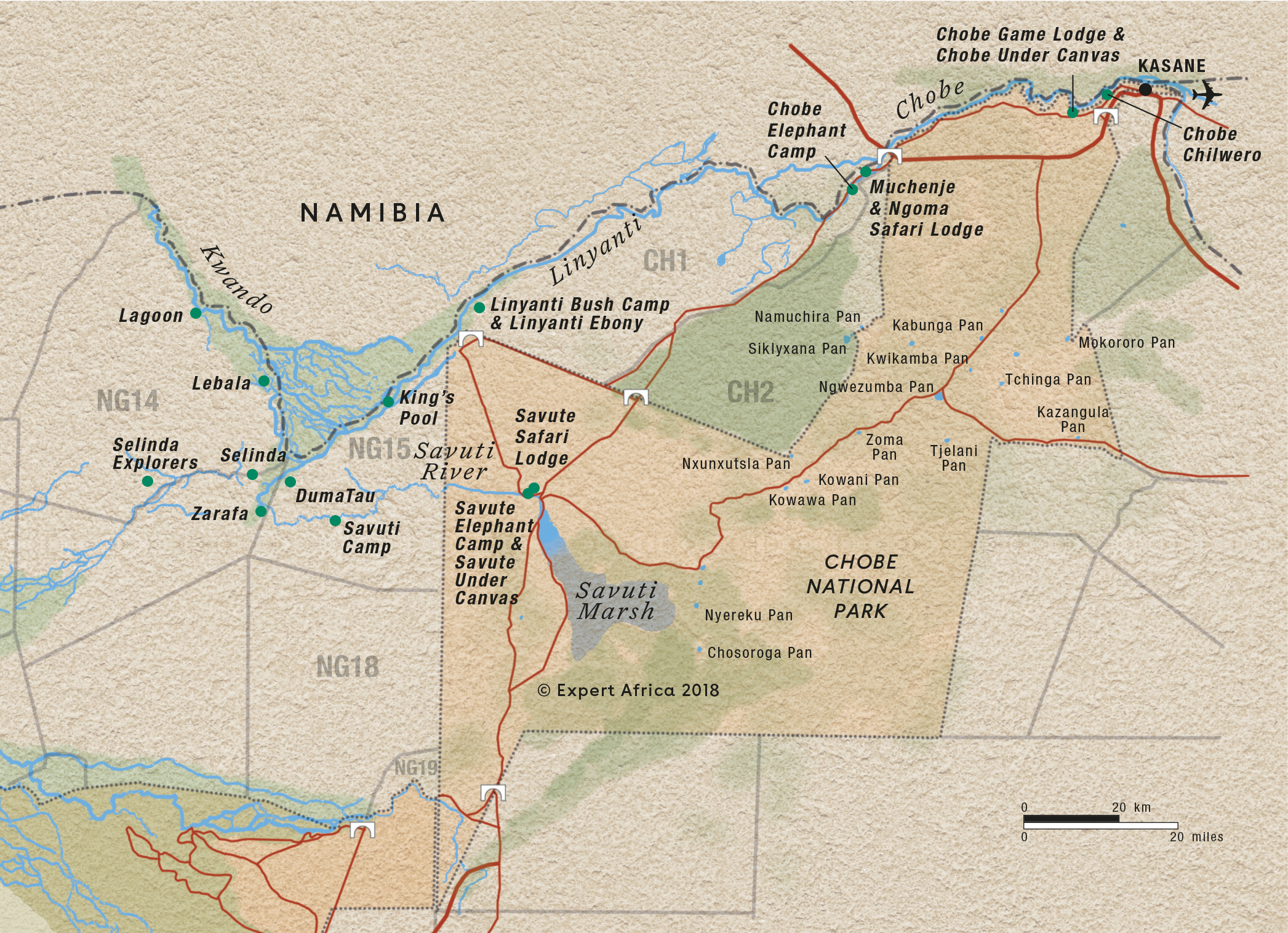
Chobe National Park: Safaris
Come to Chobe National Park on your Botswana safari holidays for impressive herds of buffalo and elephants, hunted by large lion prides, as well as magical waterways! This famous Botswana safari area can either be visited on a mobile safari or while staying at a luxurious private camp. See the list below for ideas for both ways of travelling!

Pygmy Mouse Self-drive Safari
18 days • 10 locations
WINDHOEK AIRPORT TO VICTORIA FALLS AIRPORT
A truly epic southern African self-drive safari adventure from Namibia’s mountains and deserts, along the lush Caprivi Strip to Botswana and Victoria Falls in Zimbabwe, staying at luxury lodges throughout.
US$9,800 - US$10,560 per person

Wild Dog Safari
13 days • 5 locations
KASANE AIRPORT TO MAUN AIRPORT
An in-depth discovery of northern Botswana’s wilderness, from Chobe and the private Kwando Reserve to the Moremi and iconic Okavango Delta with a great variety of activities and wildlife.
US$12,930 - US$21,350 per person
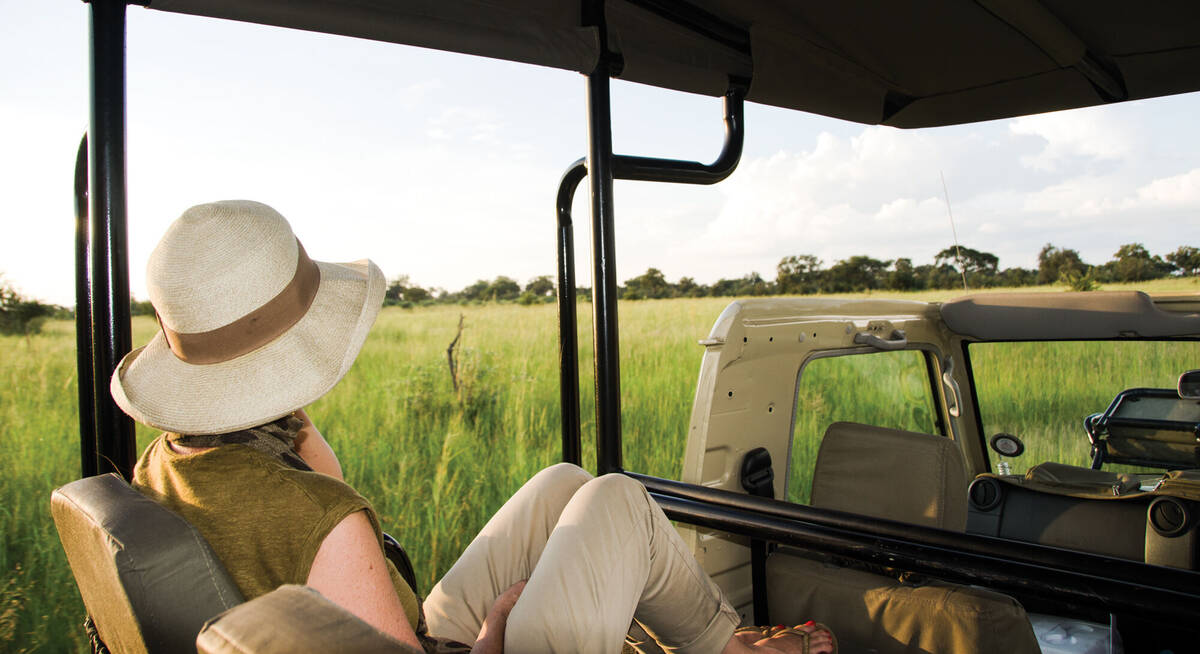
Rock Hare Self-drive Safari
20 days • 12 locations
WINDHOEK AIRPORT TO VICTORIA FALLS AIRPORT
An in-depth look at Namibia from the Namib Desert to the Caprivi, with additional stops in Botswana and Victoria Falls. This three-week adventure includes an unrivalled mix of environments and is great value.
US$7,530 - US$8,510 per person

Spring Hare Safari
9 days • 3 locations
KASANE AIRPORT TO MAUN AIRPORT
An authentic and diverse safari to Botswana combining the Chobe Forest Reserve, Savuti Marshes and the Okavango Delta. Strong wildlife viewing, a variety of activities and excellent value camps.
US$8,710 - US$14,180 per person

Sable Self-drive Safari
12 days • 7 locations
WINDHOEK AIRPORT TO VICTORIA FALLS AIRPORT
A great-value southern African self-drive adventure from Namibia along the Caprivi Strip to Botswana and Zimbabwe, combining other-worldly landscapes, unforgettable wildlife spectacles and rarely visited places, and ending at Victoria Falls.
US$8,530 - US$9,440 per person

Porcupine Safari
11 days • 4 locations
MAUN AIRPORT TO MAUN AIRPORT
Visit dramatically contrasting landscapes boasting a variety of species during this exploration of Botswana’s top-safari destinations. A combination of national parks and private reserves allows for a range of activities.
US$11,780 - US$16,860 per person

Steenbok Safari
9 days • 3 locations
MAUN AIRPORT TO MAUN AIRPORT
A classic Botswana safari exploring the Moremi, Chobe National Park and Okavango Delta. Excellent wildlife viewing and a variety of activities from three of our favourite traditional tented camps.
US$8,920 - US$13,480 per person

Leopard Safari
13 days • 4 locations
VICTORIA FALLS AIRPORT TO CAPE TOWN AIRPORT
Victoria Falls, Botswana and Cape Town – a classic southern African itinerary combining luxury, wilderness, safari and culture. We can't think of a better way to spend two weeks.
US$15,260 - US$18,150 per person

Wattled Crane Safari
5 days • 2 locations
MAUN AIRPORT TO MAUN AIRPORT
A good-value Botswana safari staying at comfortable lodges in prime wildlife-viewing areas – Chobe National Park and the Moremi Reserve in the Okavango Delta.
US$6,120 - US$8,090 per person
13 top lodges and safari camps in Chobe National Park
Our suggestions here cover both places which are inside Chobe National Park, and those just outside.
In the north of the park, the Chobe Riverfront is a big attraction, and to see this most visitors stay in or around Kasane. There’s just one lodge in the park, the stylish Chobe Game Lodge, the rest are just outside, with some even floating on the water. Further south, the iconic Savuti area is also a draw, with a number of lodges and safari camps there inside the park.

Muchenje Safari Lodge
One of our favourites in the area, Muchenje is a small, welcoming lodge at the quieter, western end of the Chobe Riverfront.

Chobe River Lodge
Overlooking the Chobe River, the intimate Chobe River Lodge is a haven of tranquillity away from the bustle of Kasane.

Savute Safari Lodge
Savute Safari Lodge sits on the banks of the Savuti Channel within Chobe National Park, and offers access to excellent game viewing, especially during the dry season.

Chobe Elephant Camp
Located in one of our favorite areas of Chobe National Park, Chobe Elephant Camp is a simple but well-appointed camp with a strong bush feel.

Savute Under Canvas
A mobile camp with the comforts of a semi-permanent tented camp, Savute Under Canvas offers guided game drives within the Savuti region of Chobe National Park.

Chobe Under Canvas
This is a typical location for Chobe under Canvas, a small, semi-permanent camp in the Chobe Riverfront area that offers good value for money and high standards of care.

Chobe Safari Lodge
Chobe Safari Lodge is a good value, hotel-style lodge in the heart of Kasane offering game drives, boat cruises and fishing trips.

Chobe Game Lodge
Chobe Game Lodge occupies an enviable riverfront location within Chobe National Park and boasts well-earned 'eco' credentials, as well as an excellent all-female guiding team.

Ngoma Safari Lodge
With sweeping views across the floodplains of the Chobe River, Ngoma offers superb food and flexible safari activities.
Closed for refurbishment 5 Jan - 28 March 2026

Chobe Chilwero
On the periphery of Chobe National Park, Chobe Chilwero offers luxurious surroundings and excellent food, which complement superb game viewing on game drives and boat trips.

Camp Kuzuma
Camp Kuzuma sits in the Kazuma Forest Reserve and is an excellent place to see elephant in particular. Away from the busier riverfront area of Chobe National Park this camp offers a luxurious base form which to explore this less visited region of northern Botswana.

Savute Elephant Lodge
Savute Elephant Lodge is a luxurious camp on the banks of the now flowing Savuti Channel. This is a classic big-game area, although its location within Chobe National Park does limit the activities which are possible here.
Excursions in Chobe National Park
Optional, extra day-trips and excursions that are possible while you’re staying in Chobe National Park. Talk to us: these excursions are usually best arranged before you go.
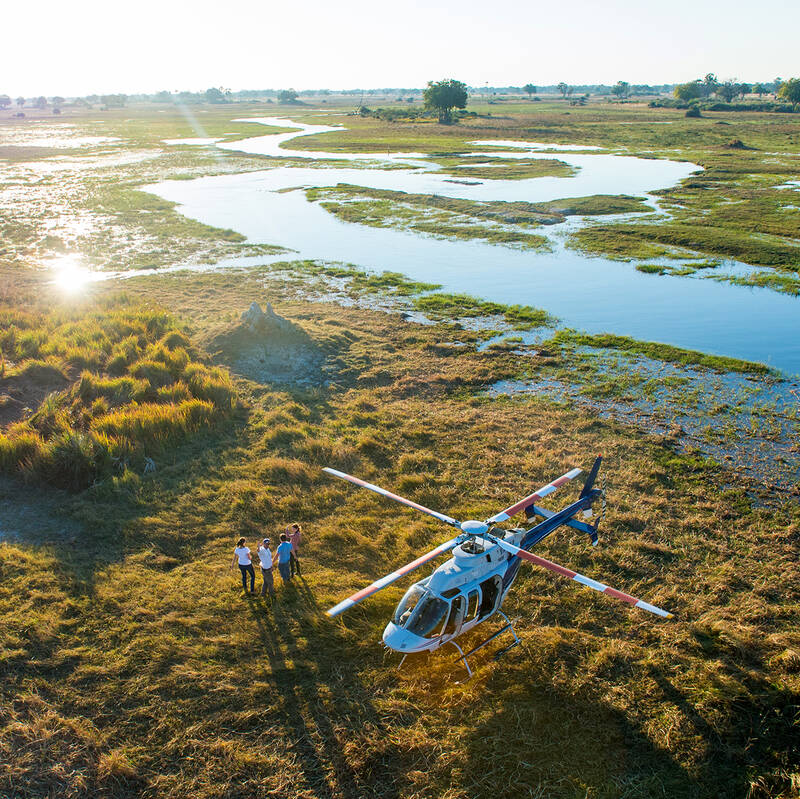
Helicopter Flight - Botswana
Various: from 30 minutes to half a day.
Low-flying, agile and offering superb views, helicopters are an ideal way to move around the Okavango Delta.You can use them instead of fixed-wing inter-lodge transfers or as an addition to other wildlife watching activities, and of course, helicopters can hover to allow that perfect pic, whereas fixed-wings can’t.
More about Helicopter Flight
Looking for inspiration on where to travel next?
Visit our trip chooser to explore your options and find inspiration for your perfect African adventure
Inspire meChobe Frequently Asked Questions
Chobe National Park FAQ
How do you get to Chobe?
From Maun to Chobe:
- By air: The quickest and most efficient way to reach northern Chobe from Maun is by flying into the modern Kasane International Airport, which serves as the main entry point for the Chobe area. Several charter airlines operate direct flights between Maun and Kasane, with a flight time of about an hour. From Kasane, most lodges and camps in the Chobe region offer transfers.
- By road: If you’re on a private mobile trip, the route is scenic and the roads are well-maintained for 4WD vehicles. It’s about 600km (6-7hours) from Maun to Kasane direct, but these trips are conducted over several days and deviate to interesting wildlife hotspots en route.
- By air: Most travellers fly from the airstrip nearest their Okavango Delta safari camp direct to Kasane Airport, for access to the Northern Chobe Riverfront area, or into one of the smaller bush airstrips within Chobe, like Savuti, for the more remote camps in the park’s interior. Charter flights are the most common and efficient option, with flight durations ranging between 60 to 90 minutes depending on your exact location within the Delta. From Kasane, we’ll arrange transfers to your lodge or safari camp in Chobe.
This ensures a seamless journey from one pristine wilderness area to another, allowing you to experience both the water-rich delta and the wildlife-dense habitats of Chobe in a single trip.
- By road: The most common way to reach Chobe from Victoria Falls (Zimbabwe) or Livingstone (Zambia) is by road transfer. The journey takes around 1.5 hours (about 100 km), including a border crossing at Kazungula into Botswana. We’ll arrange these transfers as part of our trips, ensuring that the process is smooth for visitors. If you’re travelling from Zambia, we’ll probably route you over the wonderful Kazungula Bridge!
- By air: Although less common due to the short distance, we can arrange charter flights from Livingstone, in Zambia, to Kasane, beside Chobe, for travellers looking for a quicker option. These flights take about 30 minutes from Victoria Falls to Kasane Airport, and then we’d normally arrange for you to be met and transferred to your lodge.
How do you get around Chobe?
The Chobe Riverfront is very accessible with well-maintained roads, however, for areas like Savuti and Linyanti, rough terrain, deep sand and potentially flooded areas during the wet season make for much more challenging, off-road driving. It’s wild and remote, necessitating great guiding, but making for a superb wilderness experience.
Getting around Chobe on safari could include:
- Guided game drives: Most travellers choose to explore Chobe on game drives from their safari lodge. These drives are often conducted in open-sided, 4WD safari vehicles, and are led by professional guides, giving visitors the advantage of local knowledge and wildlife tracking. Most safari camps offer morning and afternoon game drives, with the possibility of full-day expeditions to areas like Savuti.
- River safaris: The Chobe River offers the unique opportunity for water safaris, particularly along the riverfront from Kasane. This is one of the best ways to see elephants, hippos, and crocodiles, as well as a wide variety of bird species. Boat trips usually depart early morning or late afternoon to accompany sunset drinks and allow for ‘golden hour’ photography. Luxury live-aboard boats are a wonderfully relaxing experience for a few days as part of a longer trip, and a super contrast to traditional 4WD game viewing.
- Mobile safaris: A mobile safari allows you to move deeper into the park, typically covering multiple regions such as the riverfront, Savuti, and Linyanti. This involves traveling between locations with your guides and camping in different areas, giving you the flexibility to follow wildlife movements. Read more about what a Botswana private mobile safari is like, and look at Savute Under Canvas and Chobe Under Canvas for semi-permanent luxury camps or our Botswana Private Mobile Safari information for authentic mobile trips to Moremi and Chobe.
What is a Private Mobile Safari in Chobe?
Each day brings a new camp setup in a pristine area, with comfortable tents and an expert guide to accompany you throughout your trip. Game drives provide opportunities to explore less-visited spots, creating intimate and personal wildlife encounters. In the evenings, you’ll camp in wilderness locations, truly connecting with nature as you dine on delicious meals under the stars, surrounded by the sounds of the African bush and in the company of your family and friends.
For an ideal experience, our Botswana Experts recommend 5 to 7 days for a Chobe mobile safari. This allows you to fully explore the park’s highlights while providing enough time for relaxed 4WD game viewing and varied activities including walking safaris and mokoro trips. Whether you’re looking for a true family adventure or to witness Chobe’s spectacular landscapes and wildlife in depth, a mobile safari offers unmatched flexibility and immersion.
At Expert Africa, we work with dedicated, professional guides that we know well to create these overland itineraries in Chobe, often in combination with the Okavango Delta’s heartland of Moremi, so do get in touch if you’d like to know more about a private mobile safari in Botswana.
What's the ultimate Chobe River Safari?
The Chobe Princess boats are smaller, more intimate vessels with 4 or 5 cabins, cruising up to 50km of the river over 2-3 nights. The modern, en-suite cabins come with large windows offering stunning wildlife views from the comfort of your bed. On deck, there’s a plunge pool for relaxing after a day of game viewing, or you can opt for a tender boat excursion to fish, birdwatch, or explore the river’s banks with a knowledgeable guide.
Meanwhile, the Zambezi Queen offers a more luxurious experience with 14 suites, an on-deck pool, and shaded relaxation areas. Over 2-4 nights, this elegant houseboat sails leisurely along the Chobe, providing ample opportunities for spotting elephants, hippos, and other wildlife from its shaded lounges or private balconies. Jump on a small tender for fishing, game viewing and quiet birdwatching along the riverbanks
These floating safaris provide a rare blend of luxury and nature, allowing you to relax onboard while staying connected to the wildlife-rich environment of the Chobe River. They make for a perfect end to an adventurous 4WD safari holiday: no bumpy vehicle rides and 5am wake-ups, just laid-back cruising in idyllic lily-filled waterways, past undisturbed wildlife.
Okavango Delta or Chobe safari?
The key safari differences between the Okavango Delta and Chobe can be viewed in several ways:
Physical environment:
- Chobe National Park is defined by the Chobe River, which forms its northern boundary. Its landscapes range from lush floodplains to mopane forests and dry savannahs. The Chobe Riverfront is particularly famous for its concentration of wildlife, especially in the dry season when animals flock to the water. Other key areas include the Savuti Marsh and the Ngwezumba pans, each offering varied habitats.
- The Okavango Delta, on the other hand, is a sprawling wetland formed by the Okavango River fanning out into the Kalahari Desert. It's a mosaic of channels, lagoons, islands, and floodplains, creating an incredibly diverse and dynamic ecosystem. Its water-based environment contrasts sharply with the drier expanses of Chobe.
- Chobe National Park is home to some of Africa's largest concentrations of elephants, particularly along the riverfront, and huge herds of buffalo. The park also boasts impressive lion prides and supports a variety of other large game like giraffe, sable antelope, and hippos. The Savuti area is renowned for its predator-prey interactions, especially between lions and elephants.
- The Okavango Delta is equally rich but offers a more intimate wildlife experience. Its wetlands attract species like red lechwe, sitatunga, hippos, and crocodiles, along with more elusive animals like wild dogs and leopards. Birdlife is especially prolific here, with over 400 species, including water birds like kingfishers, herons, and fish eagles.
- Chobe is known for its traditional 4WD game drives, particularly along the riverfront where boat cruises are also a popular activity. These cruises offer unique perspectives on wildlife, especially for viewing elephants, hippos, and crocodiles from the water. However, walking safaris and night drives are limited to areas outside the national park.
- The Okavango Delta offers a broader range of activities. In addition to game drives, the Delta can offer mokoro (dugout canoe) excursions through the narrow channels, providing peaceful, up-close encounters with aquatic wildlife and birds. Motorboat safaris, walking safaris, night drives, and seasonal fishing trips are also available, depending on water levels, as these are private reserves and not national park. Safari camps and lodges:
- Chobe offers a mix of lodges and camps, with many clustered just outside the park: in Kasane to the east, and a few in the Forest Reserve to the west. These cater to a range of budgets, from luxury lodges like Chobe Game Lodge to simpler experiences. Riverfront lodges often offer game drives and boat cruises, with those further east, around Ngoma, being more quieter and exclusive.
- Okavango Delta lodges are generally more exclusive and lavish, often accessible only by air. These remote camps, in private concessions, provide personalised service and exclusive access to pristine wilderness. The Delta camps offer fewer visitors and significantly more intimate wildlife encounters.
- Chobe is easily accessible by road via Kasane, which has an international airport and serves as a gateway to the park. Its proximity to major tourist hubs like Victoria Falls and Livingstone makes its northern reaches popular for day trips or combined itineraries – which add to the busyness of the Chobe Riverfront area.
- The Okavango Delta is more remote, and typically accessed by light aircraft from Maun or Kasane. The Delta’s camps are almost all fly-in only, meaning visitors must book well in advance and the cost of access is higher. This remoteness, however, adds to the exclusive nature of the experience. Conclusion:
Both Chobe National Park and the Okavango Delta offer world-class safari experiences, but they cater to slightly different interests. Chobe’s riverfront and large herds of elephants appeal to those seeking classic big game safaris with easy access and affordability. Meanwhile, the Okavango Delta’s unique water-based environment and remote luxury lodges attract those looking for a more exclusive and varied wildlife experience, with activities like mokoro trips and exceptional birdwatching.
There is no question that the Delta experience and exclusivity comes with a high price-tag. Both destinations, however, deliver superb wildlife diversity and quality guiding that delight and impress discerning safari-goers.
